#birthday fave fics
Explore tagged Tumblr posts
Text
Fandom Birthday Rec List for @jrob64
Happy Birthday, dear Joni! Happy Birthday to You!!!

Okay, when I set out to make this list of my favorites of your works, I had a couple in mind right off the top of my head, and thought "This is a no-brainer! It'll be easy!" You would think I'd have known better after the massive list I created when Krystal asked for our favorite fics overall a couple years ago and I ended up making a Sweet 16 style bracket to even narrow mine down. Needless to say, I ended up with a solid dozen stories on my paper, instead of the five or six I needed, and discovered a few hidden gems from way back before I knew you that I hadn't even read!! However, my very, VERY favorite has never wavered and is still exactly the same - you'll see! ;)
Anyway, I am so glad I found your wonderful writings, have gotten to know you in person, text with you, travel with you, and become genuinely good friends. Your are a blessing in my life, and I hope this gift brings a bit of a smile to your face as I try to celebrate the joy you've shared with us all in creating further adventures for our pirate and princess. Happy Birthday!!!
**Top 6 Favorite @jrob64 Fics (in descending order)**
#6 - "One Thrill Ride Leads to Another" (my own birthday fic! ;p )

This five part (six, with the epilogue) story is pure fun and chemistry and sweetness overload. I adore it more than I can really say, and am beyond flattered that a handsome sight and chance comment of mine helped to birth the original idea. And no, it isn't even just because this one include an alive and happy Graham as supporting character and a hilariously hot secondary Red Huntsman plot line -- though it certainly doesn't hurt!! ;) My rambling can't really do this one justice, so if anyone reading this has missed it, I beg of you: Check it out for yourself! It's a perfect summer treat!
#5 - "Silly Songs With Killian" (Modern AU one shot - adorable!)

Okay, I realize that I am using a valuable spot on this list for a fluffy little one shot, but it's just that much fun and has that much heartwarming power. I dare you to get the image of Killian playing VeggieTales on the guitar for a wildly enthusiastic audience of one small boy who is madly excited by the effort out of your head! You won't be able to - it's gonna stick with you and make you smile every time it floats back in!! If you've had a bad day and need a pick me up, this is your fic right here!
#4 - "Taking on Mrs. Jones" (hilariously hot silver fox one shot)

This is another more comic/lighthearted one shot, but I just can't resist it. In fact, I re-read it in making certain of my list, and I love it all the more. This one features a slightly older, professor Killian (one of my serious weaknesses) and a married version of CS. Plus, when he gets an overly flirtatious new co-worker who makes him uncomfortable - Emma comes perfectly to the defense of her man and teaches that girl a lesson.
#3 - "Ghosted" (a WIP supernatural modern AU MC for @cssns24)

This story is still in progress, but it has very quickly jumped the list to become one of Joni's best, best offerings (in my humble opinion)! I love the unusual and intriguing plot and can't wait to see how it will turn out. The inclusion of Will and Belle as secondary characters (and a secondary love story) is wonderful👩🏻🍳 *chef's kiss!* And a ghostly version of Liam absolutely tugs on my heart. Definitely check this one out if you haven't yet.
#2 - "Always in my Heart" (5 Part Modern AU, so feelsy and angsty and deep)

This one moved me to tears in the process, way more than once. I loved the long lost friends reunited aspect of this story, right from the start. I loved the sense of adopted family Emma has with David and MM, and most especially Ruth. (I always loved David's mom in canon, and the chance to see a lot more of her in this fic, and to see what this version of her means to Emma was priceless, even if heart wrenching too.)
#1 - "Sowing Seeds of Trust" (and its extra chapter "Marco's Legacy")


This story was the first one of yours I discovered, Joni, and I was completely captured! It was wrapped around my heart from the very first chapter. I loved the vulnerability and need, but also strength and resilience, in this version of Emma. I loved Killian's support, understanding and love in how he reached out to her. I love the friendships with David, MM, Ruby, and of course MARCO!! (He steals the whole show here, honestly!) The faith and restoration and perfect "happy beginning" after trials in this story are original, unique, and unforgettable. It's always going to be my favorite, I think, as it lead me to your writing to begin with, and it touched me deeply.
*Honorable mentions - if anyone is curious - also not to be missed:
"Snowstorm Confessions"
"Lonely No More"
"Faultline"/"Seismic Waves" (Liam x Elsa)
"Where Her Heart Belongs"/"Her Heart's Home"
"For the Sake of Henry"
Hope you enjoy your little list - and an absolutely wonderful day!!! Very Best Birthday Wishes to You!!!

#fandom birthday rec list#birthday fave fics#happy birthday @jrob64#fave cs fics list#top six @jrob64 fics#such a talented shipmate ⚓️💕⚓️
8 notes
·
View notes
Text
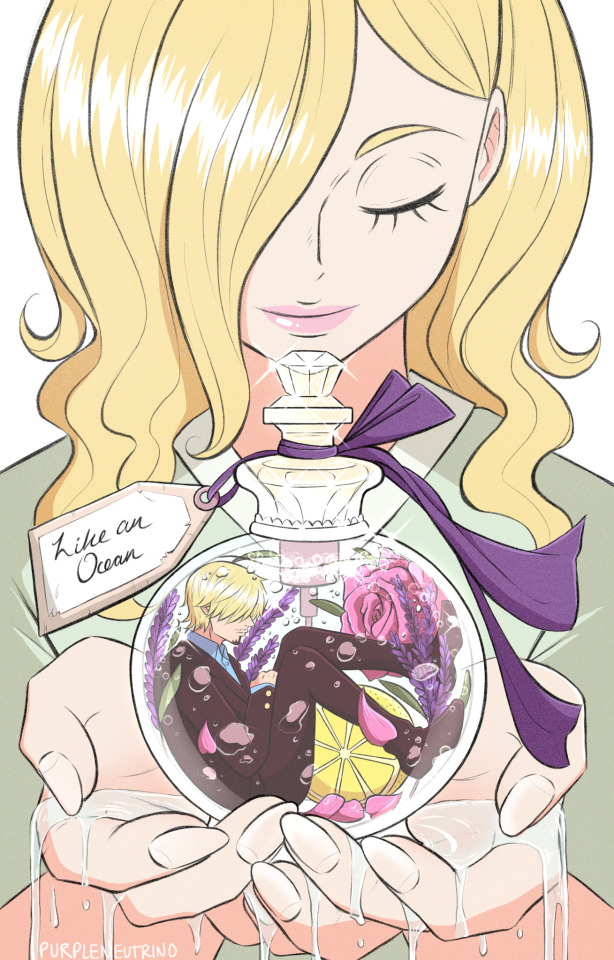
Like An Ocean | Oneshot Fic | Gen | 8k
"An unexpected find at a marketplace has Sanji lost in the depths of his memories. Nami is there to help bring him back."
[Sanji Week, Day 5: Family]
Emotional hurt/comfort, angst with a happy ending
Sanji POV
Sanji & Nami friendship
Here on AO3 💛 Bonus Illustration
#one piece#sanji#sora vinsmoke#nami#sanjiweek2024#sanjiweek#one piece fic#black leg sanji#cat burglar nami#yeah i wrote 8k worth of angst for my faves birthday what of it?#my art#my fic
554 notes
·
View notes
Text
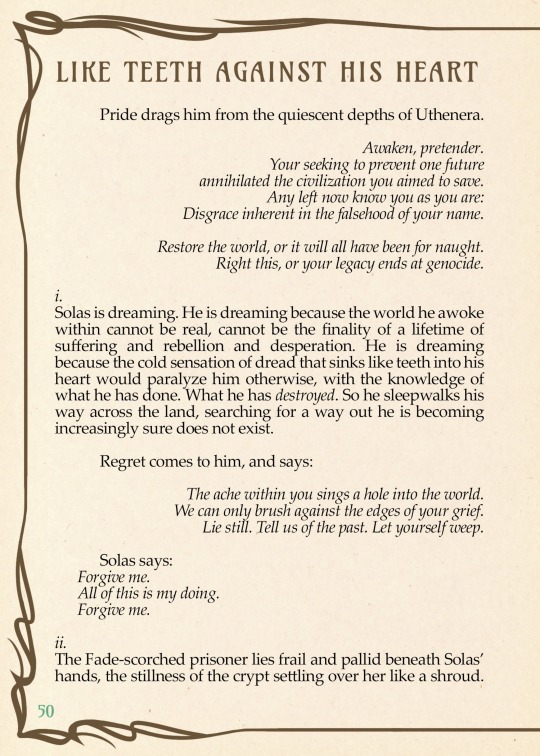
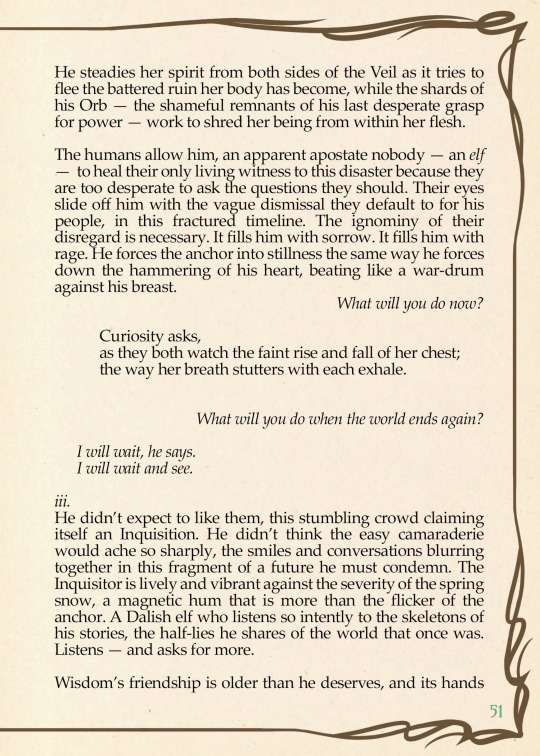
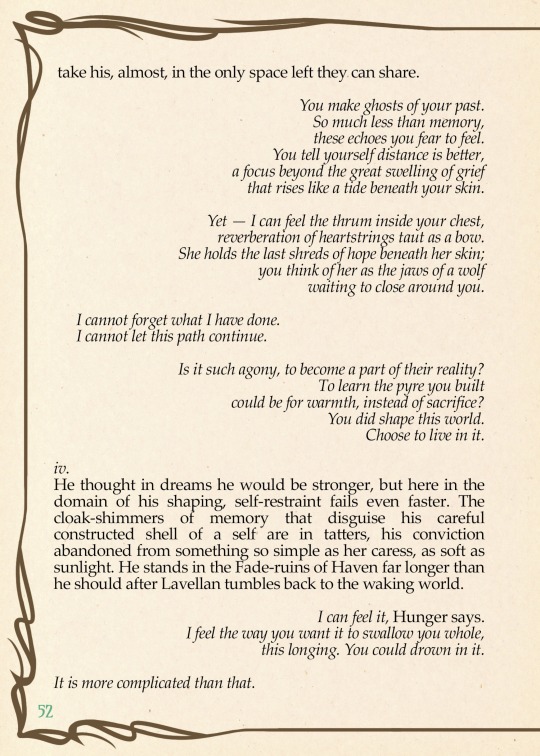
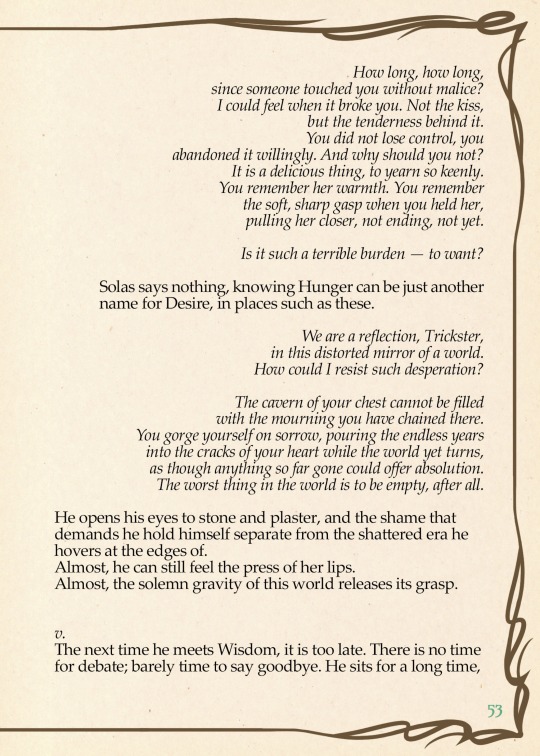
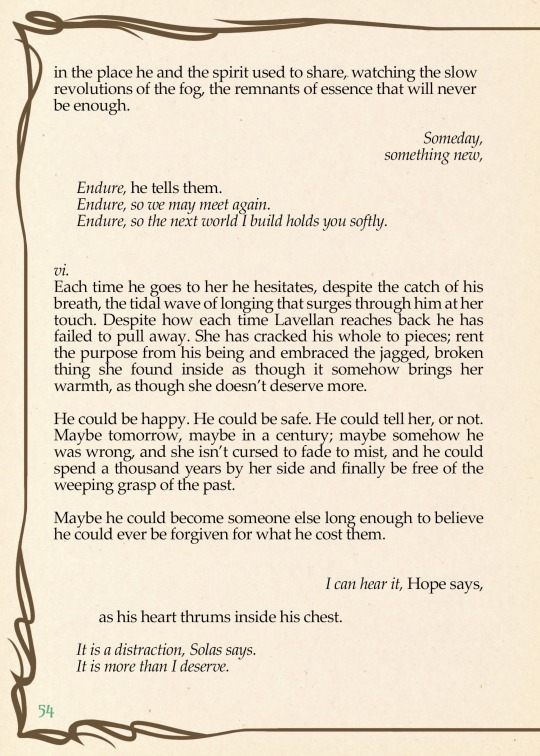
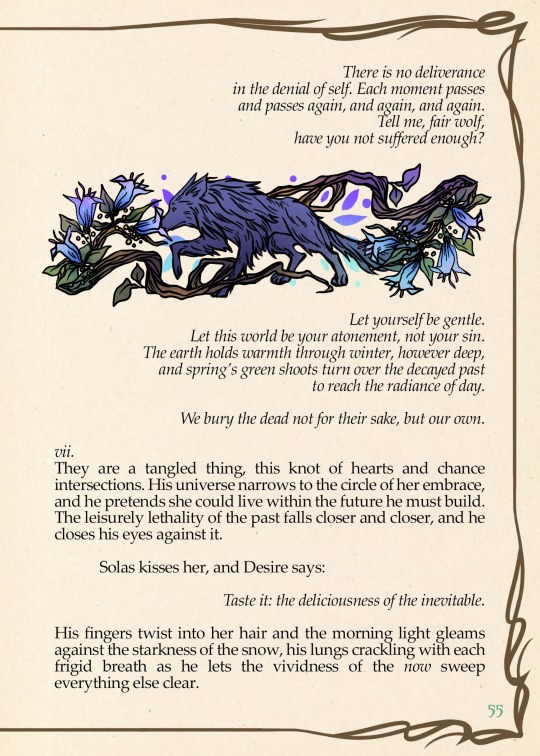
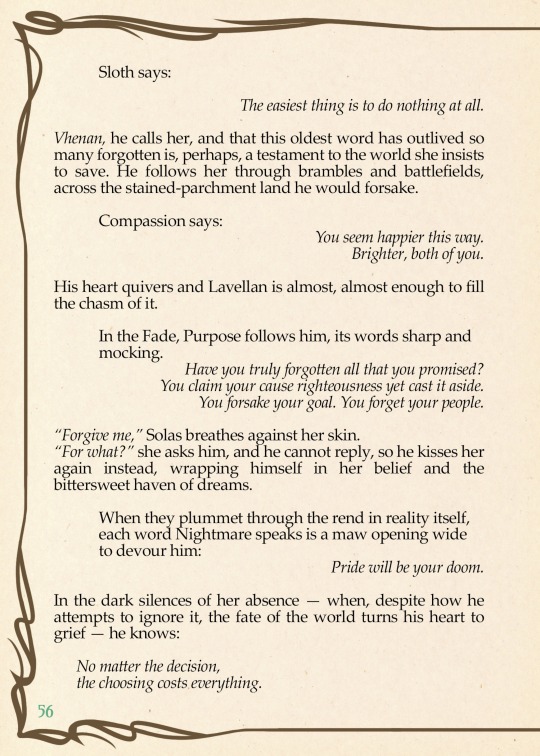
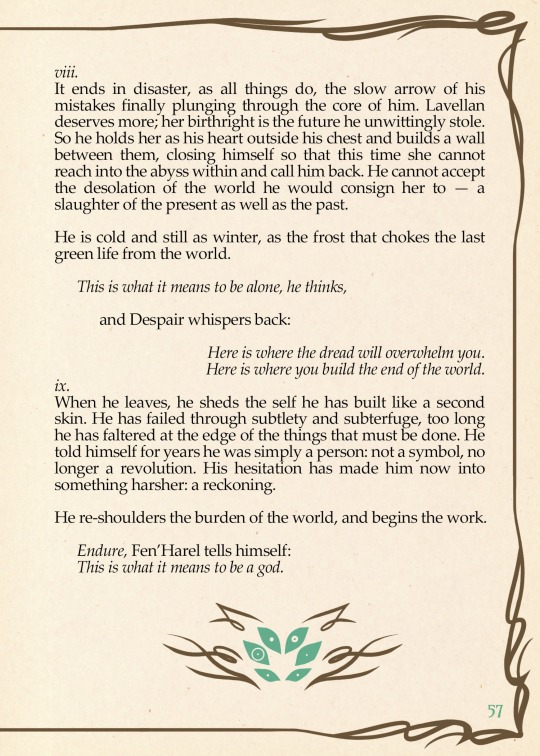
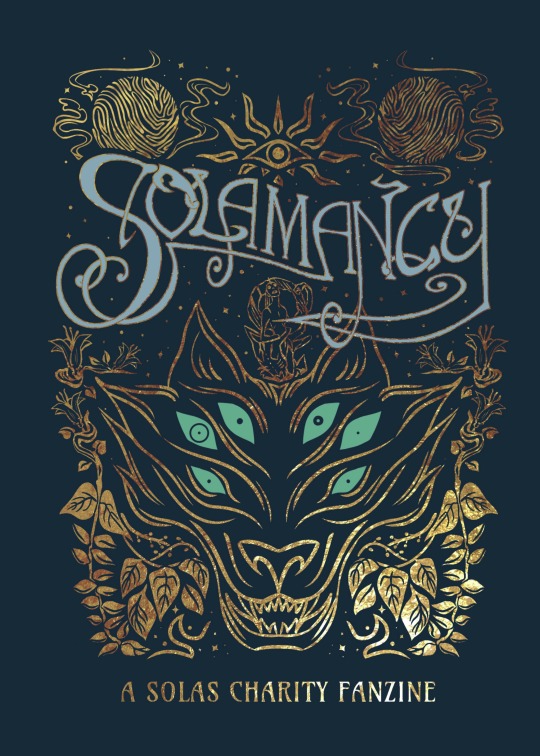
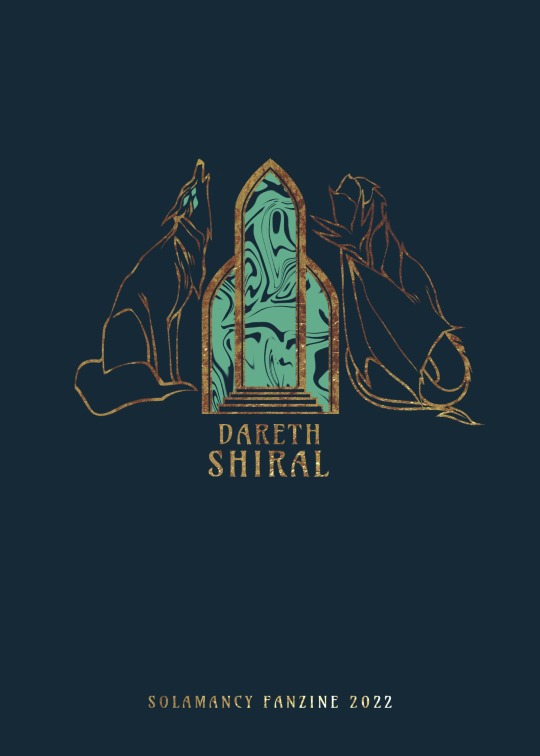
I never really liked how my Solavellan prose-poem Like Teeth Against His Heart looked when formatted on tumblr, and since the @solamancyzine zine itself is no longer available for sale digitally or physically, I thought it'd be nice to upload how it appeared on the pages itself instead here as a record. When I was writing it part of the fun/challenge was making sure the lines would fit in booklet spacing without too many awkward gaps, or overflowing.
since there's too much to put in the alt text per image here for accessibility: here's the prior tumblr upload (as text not images) but it's slightly better on AO3 though... it still sucks to view on phone there. that is the danger of poetry with special alignment I guess!
The layout design & other zine in-line art was done by Patricia Vi/kiwipon :)
#ramblings#my writing#dragon age fanfiction#solas#solavellan#dragon age#dragon age: inquisition#still slowly marinating sequels for tresspasser and dav#it will be slow tho gotta give em time to manifest fully in my heart#birthday reblogs#well. a new post but. same idea#got to it in my reblog spree and went Hmmm Uhg so here is this instead#that wolf was my fave of the internal designs and i was so pleased it ended up with my story lol#fanfic#da fic#like teeth against his heart
70 notes
·
View notes
Text
✯my entry for the @croptopjames fest✯
jegulus | 1.3k | non-canon/magical au
summary:
It was revenge, they say, for a prank they played on the other houses. So if Lupin and Pettigrew got their trousers turn into shorts, and Black got his shirt turn into a crop top, then that means Potter—
“Did you hear what happened?”
“They say it was revenge for a prank on the other houses,”
“Seems like a weird way to take revenge,”
“Someone said it was a new statement for the dress code,”
“Of course those Gryffindors would come up with something like that,”
“Mila from my transfiguration class says someone charmed their clothes to transform into something else whenever they wear it. You know, trousers turn into shorts and—”
“Oh, so that’s why Lupin and Pettigrew were wearing shorts! But why was Black’s shirt cropped? Not that I mind the view but—”
“Maybe the spell worked in pairs? If Lupin and Pettigrew got shorts, and Black’s shirt was cropped, then maybe Potter got—”
But Regulus had heard enough.
He should’ve known something was off the moment he crossed Lupin and Pettigrew earlier that day wearing shorts of all things, but if he was completely honest with himself, his mind was somewhere else and didn’t even think twice about it. But now, after eavesdropping on a conversation of some sixth years, maybe he shouldn’t have been so dismissive.
Entering the Great Hall for lunch, Regulus makes a b-line for his seat at the end of the Slytherin table and starts filling his plate absentmindedly, trying to ignore the sight of his brother at the Gryffindor table, talking animatedly to Lupin and Pettigrew, still in those ridiculous clothes. His mind inevitably going to the person who’s conveniently, not among them.
The thing is, Regulus isn’t capable of thinking of a piece of clothing that would look bad on James Potter.
He has seen the guy practising on the Quidditch pitch for Salazar’s sake. He has had a front row of what James’ body looks like when he leans on his broom, quaffle in hand, gaining some speed over his fellow teammates. He has seen how his forearms look when he grips the handle hard and how his thighs squeeze the rear of the broom when he’s doing a particularly hard move so he doesn’t fall.
So no, he doesn't think there’s a piece of clothing that would look bad on him, he could pull any look, especially a crop top, and that is the problem, isn’t it?
Regulus could feel his cheeks warming at the thought. Oh no this is bad, what he’s going to do if he sees him wearing that? He’s going to make a fool of himself and he can’t afford that. No, Regulus needs to get the fuck out of there if he wants to make it with his dignity intact.
Practically stuffing his face, Regulus tries to be as quick as possible, cursing in his mind at the idiot who hexed James Potter to be stuck with that particular piece of clothing, or lack thereof, more like.
“Let it not be said that we don’t do anything nice for you, Regulus,” a voice comes from behind and Regulus freezes and then groans.
Looking up from his plate, he eyes the pair who has taken the seats in front of him, both looking smug as fuck, “You guys are unbelievable,”
Evan hums in agreement, “Aren’t we just?”
“Wasn’t a compliment,”
Barty tuts disapprovingly, stealing a piece of food from Regulus' plate and popping it in his mouth, “Why Regulus, we thought you would be thrilled by this, can’t believe you’re this ungrateful.”
“Crop tops, really?” He huffs, stabbing whatever is left of his chicken, “And don’t get me started on the shorts.”
“Those were my idea,” Evan mentions.
Regulus doesn’t get it, “Why though?”
“We couldn’t be so obvious and only hex Potter, we had to cover our traces,” Barty says, turning his head slightly to look at the Gryffindor table. “Besides, the others look ridiculous, minus your brother of course, the bastard is fit as fuck.”
“Why though?” Regulus repeats, this time even more aggravated at the notion of Barty ogling his brother.
Evan gives him a pointed look, “You know why,”
Regulus drop his gaze, sniffing lightly. “I don’t know what you’re talking about,”
Barty smirks at him, “You will,”
There’s a sudden ruckus at the entrance. The voices grow loud and you could hear some whistles here and there but what actually catches Regulus’ eyes when he looks up, is the man at the doors.
Something inside him is pleased to notice he was right about James looking good in any piece of clothing, especially something that would show his really fit body. James is looking a little dishevelled, but that only makes him look even prettier. Still enthralled by the sight of James Potter wearing something this sinful, Regulus notices a little too late a voice shouting really close to him, efficiently taking him out of his rivery.
“Looking good, Potter!”
“Barty!” Regulus hisses in embarrassment as James looks in his direction. And oh, the way he smiles at Regulus as soon as their eyes connect.
Regulus is incapable of doing much else under the intensity of that look, he wants to run like he had planned before. He wants to hide, not only from James but from the way he feels when he’s near. Pathetic as it is, the only thing Regulus is capable of doing is following James as he makes his way to the Slytherin table.
Regulus blinks hard at that. Wait, Slytherin table?
Before Regulus can process that, James is already standing right in front of him.
“Rosier, Crouch,” he greets them, still not taking his eyes off Regulus.
“Potter,” Barty nods in his direction. “Nice shirt, does it come in men’s?”
James grin turns sharp, “You don’t want me to answer that, Crouch,”
“Okay, time to go, have a great one!” Evan practically drags Barty aways as the latter cackles like a madman all the way out of the Great Hall.
When his laugh fades, James is still in front of Regulus and Regulus is purposefully looking at anything but his face, so his gaze inevitably fall at the only thing at his eye-level, James’ stomach.
There are beads of sweet running down over that beautiful golden skin and all Regulus wants, is to touch it to see if it’s as soft as it looks. Wondering how it would feel under his teeth.
James clears his throat to catch Regulus' attention. Unnecessary, since he hasn’t lost it the moment he entered the Great Hall.
“So, Regulus,” he starts.
“Yes?” He can see the trail of hair disappearing under the navy trousers. He’s having a hard time not to reach out and touch it.
He’s being so brave about this whole thing, someone should notified his mind-healer.
A beat of silence and then a hand, reaching for his chin and turning his face up, callous fingers against his soft skin. The sight of James’ playful smile makes something inside him melt.
“My eyes are up here, love.”
His cheeks get warmer out of the embarrassment of being caught. Not that he was subtle in the least but still, embarrassing.
James doesn’t seem to mind in the least.
“You’re blushing,” he notices.
Regulus' face is practically red at this point.
“Shut up,” he grumbles and James chuckles.
“No, no, I like it,” he says, voice soft. “Red looks good on you,” and then he proceed to fucking caressing his cheek.
It’s settled then, Regulus is living inside a romantic novel where making a fool out of yourself in front of someone you fancy is necessary and crop tops are a thing.
“What do you want?”
“Just wanting to say hello,” James says, eyes softening. “Hello,”
“Hi,” Regulus says, like an idiot.
“Fancy a Quidditch game with me?”
Regulus frowns. “Right now?”
“Why not?”
“You’re not wearing the proper gear,”
James smirks, “I think I will manage,”
This is a bad idea, a terrible one and Regulus knows it, everyone knows it and yet— “Lead the way then,”
James lets his hand drop from his face, and it takes all of Regulus not to chase the touch, but the feeling of loss is quickly replaced with excitement when he sees James holding his hand up for Regulus to take.
Regulus does, of course he does.
Hand in hand, they make it to the Quidditch pitch.
Together.
#well. let it not be said I never do anything nice for you guys#happy birthday James!!!#pathetic Reggie my fave Reggie#wait for the slutty shorts James later today!!#and just fyi Sirius looks amazing in that crop top too#also pardon any mistakes I wrote this last night half asleep#anyways enjoy!!!#james potter#James Potter birthday#croptopjames#jegulus#jegulus fic#jegulus microfic#(?) idk
272 notes
·
View notes
Text
just think itd be funny if they met irl
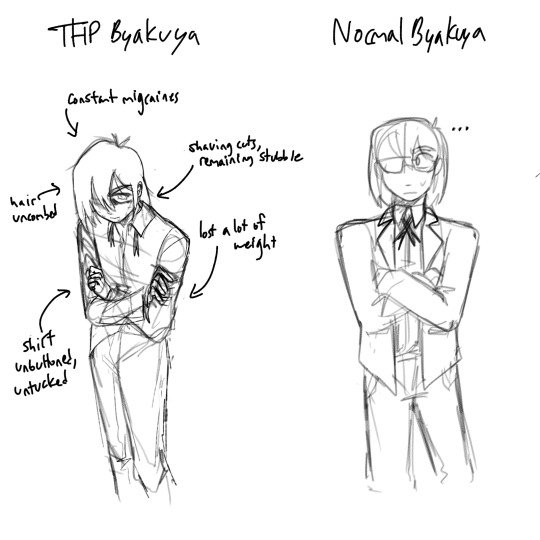
#thpff#byakuya togami#happy birthday byakuya btw#dont have time for anything polished so uhhhh old doodle go#thp byakuya: this is what i should be. this is what was taken from me. all it took was one loss and i have become a shell of myself.#canon byakuya: what the hell is your problem#thp byakuya doesnt look exactly like this at the current point in the fic (around chap 20) but! who knows! he might soon :)))))#love taking my fave chars and locking them in a washing machine! love putting them through stress and trauma!!#canon byakuya havng his ghost of christmas present moment. get dickens'd idiot#i will never draw the other eye#thp byakuya isn't eating as much bc of repeat headaches/nausea from his vision hence the weight loss#also has been losing motivation to keep himself looking as cleaned up as he normally i.e: he fucked up shaving so he gave up#is generally a lot more paranoid and untrusting of his surroundings. he just has a lot going on#soooo much fun drawing him fucked up and shaken i think it should happen more often tbh#my arts
81 notes
·
View notes
Text

Max smiles and bumps his shoulder against Charles. Maybe this summer will be like normal, they will go back to how things were. Maybe last year was a fluke, maybe this summer will be the same. It's everything Charles could want.
girl who does not know how to draw an orange peel made a little something for erosion by @charleslelurk <3
#this fic is just. my god. i read it months ago but was INSPIRED#it is so full of lines and images i couldnt really pick one or two and i wanted to have EVERYTHING#anyway. fave part is the pool tiles#second fave part is if you zoom into charles' right leg in the bottom there#17th birthday party on molly iykyk#anyway. posting before i go back and make forty thousand edits#erosion#lestappen#my doodles#f1 art
30 notes
·
View notes
Text
Febuwhump Day 10: Human Shield
Ao3
CW for blood and injury
————————————-
It is raining. A torrent of water cascades down from the sky, soaking Warriors and plastering his tunic to his skin. The fierce winds whip his hair into his eyes, washes the ground out from beneath his feet. Fighting in such conditions is…less than enjoyable to be certain.
But such is the way of heroism, he supposes. If you come across a heavily populated monster camp, you can’t very well just turn around and walk away. Even if it is raining bokos and keese.
“I’m gonna assume,” he remarks, as he drives his sword into a nearby moblin and almost slips in the mud, “that this isn’t your doing Sprite.”
He can’t see Time’s expression — the old man is busy slashing at the handful of beasts currently trying to cage him in — but he can tell that he’s grinning anyway.
“Not this time, no.” Time whirls in a spin attack, sending monsters and mud and water flying in all directions. “Believe me, if the Song of Storms had the power to end this downpour, then I wouldn’t hesitate to play it.”
Warriors chuckles. “And here I was thinking you liked the rain.”
“I do when I don’t have to fight an entire camp of monsters in it.”
Warriors laughs again, bringing his sword in a harsh, upward stroke. Black blood flies, splattering into the makeshift river sprouting into being beneath his feet. Quick as a flash, it is washed away.
The feeling of victory is short-lived. Several more monsters jog up to take their fallen companion’s place. Warriors steps back, shifting his feet to get a better grip on the ground. They come at him and he whirls in his own imitation of Time’s move mere seconds before.
“Well, if this is what it takes to get you back for all those times you drenched me for no reason besides your own gremlin joy…then I’ll deal.”
Time faces him from across the space that separates them. Raindrops drip from his hair and run in rivulets down his face. They wash away the blood dribbling sluggishly from a cut across his forehead. They can do little, however, for that which stains his trousers right above his boot. Nor can they rinse off the mud that sullies his usually spotless armor.
But he smiles as though none of that matters. And for a moment Warriors sees a mischievous little forest child, grinning up at him as he complains about his latest prank.
“Truly?” He cocks his head, brings his claymore down with hardly any effort, and sends ten monsters soaring. “You would endure this just to get back at me? And for something that I allegedly did years ago? I never took you for a petty person, captain.”
Warriors rolls his eyes. He is traveling even deeper into the camp now, cutting down the monsters that try to get in his way. There is a cluster of them in the middle of the encampment, gathered around a skeletal treasure chest. He’s willing to bet that killing them will make the largest impact.
“I’m not being petty, Sprite. I’m defending my honor.”
“Ah. My bad.”
Time’s voice has a lilting tone, mischievous and slightly mocking. It has been too long since Warriors heard it. Too long since he has seen the child hidden deep within the man trying to be the responsible one in their little group. The leader.
“Well, is your honor suitably — ”
He cuts off abruptly and Warriors cranes his neck in an attempt to ascertain the disturbance. It’s difficult to see over the many heads of his opponents, however, and even more so through the torrent of murky water.
In the end, he doesn’t have to see a thing to realize something is coming. Something large and metallic and decidedly different from the beasts they have battled thus far.
A fast, panicked tune sounds in Warriors’ ears, alarm bells jingling like the notes on a piano.
The monsters surrounding him skitter out of the way, shrieking in fear. In the space that they have left shines a blurry, crimson light. It emanates from a single eye of purest blue, situated in the cylinder-shaped head of a skulltula-like monstrosity.
And it is pointed straight at him.
The air itself begins to heat, turning cool rain lukewarm. Warriors’ eyes go wide.
There isn’t time to run, there isn’t room to run, but he needs to try anyway, he needs to get away…
Arms working without conscious effort, he lifts his shield and prays that it will be enough.
“Captain!”
Firm hands connect with his shoulder. Warriors stumbles sideways, slips, and splashes down into the mud. Heart in his throat, thoughts a jumbled mess of adrenaline and panic signals, he scrambles to all fours.
Only to collapse again mere seconds later when the world erupts.
Crimson light blinds him, molten heat smothers him. The air is thick with it, screaming with the agony of it.
Or maybe someone else is screaming. He can’t tell. All he knows is that he can’t breathe, can’t hear, can’t see anything save for the cries of destruction.
Again and again, the monstrosity fires. Again and again, heat batters at all sides, yet somehow doesn’t touch him.
And then, it’s over.
Warriors can only lie there for a moment, ears ringing, breath coming in ragged gasps. Slowly, painstakingly, the world crawls back into focus.
Carnage lies everywhere. Every monster has disappeared, either escaped into the forest or lying in the dirt. The gore that they have left behind peppers the area. Trees and bits of rock are strewn about, shedding leaves, branches, and pebbles into the rivers of mud. The towers that the beasts had stood upon are no longer the stalwart things they once were. Some are only half standing, others little more than shattered pieces of wood.
And in the midst of it all crouches the smoldering form of the mechanical skulltula that had borne down upon them so quickly. Beside it, lies another of the same build and same size. The lights on that one have just begun to flicker out.
Dazedly, Warriors stares at them from within a strange veil of blue. Then, slowly his gaze drifts to the hero that rises before them.
Time stands straight and tall amongst a river of mud and gore. In one hand he clutches his gilded sword in a white-knuckled grip; in the other his shield. Cracks snake along the pearly silver surface.
Water runs off of what is left of his armor, soaking into his tunic and trousers where the plates have been blown away. Blood oozes from a cluster of deep cuts speckling his upper back. More of the same type mar his left leg and hip.
His shoulders rise and fall with every haggard, gasping breath.
“Sprite?” Warriors croaks and Time turns to him.
He smiles, even as blood trickles from his nostrils and mouth and the gash on his cheek. Even as he wavers.
“Alright, captain?” He croaks, right before his legs give way beneath him.
Instantly, Warriors is on his feet. The haze of shimmering cerulean fades as he stumbles up, leaving behind remnants of an oddly familiar magic.
But he doesn’t have time to ponder that mystery.
He slides to his knees in the mud and pulls Time into his arms. The hero slumps against him. Quickly, Warriors looks over him, assessing the wounds that he can see.
The gashes he had seen before are claw marks, he realizes now, as though a giant beast had tried to pin him to the ground. And the burns searing his arm and side look disturbingly similar to Wild’s scars.
Warriors drags in a steadying breath. Time needs a potion at the very least. Preferably a fairy.
They have neither.
“Sprite.” His voice is oddly detached. To his ears, it sounds as though it is traveling from very far away. “What was that?”
Time’s eyelid flutters, showing a slit of blue. Raindrops roll down his cheeks like tears.
“Nayru’s love,” he croaks, and a smile quirks his lips. “Takes an a-awful lot of damage.”
Warriors’ eyes widen slightly as it hits him.
A spell. That blue haze that had shielded him from the onslaught of fire was a spell. One that Time had cast on him and not himself.
“Someone had to kill them,” comes Time’s quiet voice, raspy with pain. “And I didn’t have enough magic to cover the both of us.”
Warriors looks back down at him and there is no remorse in his gaze. Only calm acceptance.
The captain wants nothing to do with it.
“Well, I’m not losing you,” he grits out. “You deserve to go out in a warm bed, in a warm house, when you’re ancient and insufferable. Not like this. Not here.”
Not because you sacrificed yourself for me.
Time’s hand finds his and squeezes. His fingers are frigid, wet with water and blood. But his touch is firm despite the weakness caging him in. Firm and reassuring.
“You s-sure you can handle me when I’m ancient and insufferable?” He murmurs and Warriors chokes out a chuckle.
“You can bet on it, Sprite.”
He drags himself up, slipping in the cursed sludge that the ground has become. But he manages to gain a steady enough footing. And when he drapes Time’s arm over his shoulders, he is able to take the older man’s weight without losing his balance.
“I’m going to get you back to camp,” he assures him, as Time lets out a low groan, eye slipping closed once more. “My medical supplies are there and I’ve got a few potions. Hyrule can heal you if we need him to, as well.”
Time nods. Warriors tightens his grip. And slowly, arduously, they begin their journey.
#and here’s today’s lol#yes I’m picking on time yet again#there’ll be many more days of that I assure you#such is the price to pay for being my blorbo#plus today’s my birthday so I’m legally obligated to torture my fave XD#febuwhump 2024#febuwhump day 10#linked universe#linkeduniverse fic#whump#angst#lu warriors#lu time#trin writes#blood tw#injury tw
80 notes
·
View notes
Text

I CELEBRATED MY BIRTHDAY TODAY!!!!



mini lewis approves!!! 🥰🥰🥰
#the pic on the cake is my current fave pic of LH#and blue is my fave color#it tasted so delicious i swear!!!!#(if anyone's wondering: fic updates will be next week)#f1#lewis hamilton#lh44#birthday post
21 notes
·
View notes
Text
happy not birthday - katie gavin (muna) x fem!reader
Synopsis: katie's gf hates her bday but loves katie <3
G's notes: i'm baaaaaaack, also its babygirl's bday everyone say hbd babygirl!!!! (y'all this isn't edited don't come for me ok?)
WC: somewhere around like 1.1k (hehe)
Warnings: RPF, negative bday talk, crying, hot girls cry on their bday, reader is afab, soft!gf coded, kissin', light touchin', no fundamental physical descriptors except hair that fingers can run thru??
It feels like a feather, soft touches moving over your neck and shoulder. Rousing you from your sleep, the touches tickle, and you hear a chuckle against your skin. Suddenly awake, eyes half opened, fingers resting on your forehead to block the sun, you only see the cracked window before turning your head and seeing your girlfriend's jawline. Katie's face in tucked into your neck, pressing small kisses and nibbles along your skin.
"G'mornin'," Katie says softly, her lips pressing to your cheek, turning your head towards her as she backs away and off the bed. From the nightstand, she grabs a chocolate cupcake, with pink and yellow sprinkles covering the mountain of frosting on top. She pulls out a lighter and lights a sparkly candle before starting to sing "happy birthday".
You groan, momentarily forgetting what day it was when she was kissing your neck to wake you up. "Katie..." you mumble, rubbing your face. You can hear them smiling as she sings, crawling onto the bed, and sitting on her knees. You sit up, your girlfriend's excitement enough to indulge her despite your feelings about your birthday. You smile softly as she finishes the song with an over-the-top elongated note. "Okay, okay, enough," you mutter, the smile widening on your face as she presses her knees to your legs.
"Thank you for indulging me, sunshine," she says as you blow out the candle, hands rubbing your eyes gently.
"You gonna take a bite?" "Now?" "Why not?"
"It's...7:30? Kay, why would you wake me up at the ass crack of dawn?" you ask incredulously, taking the cupcake from your girlfriend.
"We have plans today...don't be mad..." Katie says sheepishly, kissing your cheek and standing up from the bed.
"I don't want to do anything, baby, it's just Wednesday-" you start.
"No, it's not just Wednesday; it's your birthday, and I know how you feel about it, but I want to celebrate you. Please let me, just for today?" Katie asks, her voice almost pleading as she rifles through your shared dresser. If you weren't so annoyed by the prospect of plans, you would've commented on how pretty she sounds begging.
"Katie."
"Yes, peach?" she smirks, grabbing some jeans and a shirt and laying them on the bed before crawling over you. She takes her thumb, wiping some of the icing off your bottom lip before sucking the tip of her thumb and then kissing you softly. Your eyes struggle to open as she pulls away from your lips, lost in the taste of her.
"Don't start with that," you groan softly, finally opening your eyes and staring into her own. She chuckles softly, knowing how the nickname gets you riled up.
"I just don't get what the big deal is; it's just a birthday..." you start again, causing Katie to roll her eyes. "Fine, fine, it's not your birthday, it's just- it's just "you day," okay? So I'm gonna celebrate you, that okay with you?" they say softly, rubbing your cheeks cockily.
"Whatever," you mumble, fighting a smile as her lips move down your neck.
An hour later, you're both dressed heading out to breakfast. Katie's hand rests on your thigh as she drives to breakfast, the weather warm and sunny. You listen to the new gayotic episode while stuck in LA traffic that they recorded with Julien, turning to Katie every time you laugh at something your girlfriend or friends say. After parking, you walk into the restaurant hand in hand, your eyes immediately drawn to a large table; your friends and their partners sit, yelling, "surprise."
Your jaw drops, Kelli the first to greet you with a sneaky smile, holding a sash and a birthday headband. "Don't be mad at meeeee," she whispers before putting them on you and squeezing you tightly. Katie smiles at you, eyes shining with gratefulness as she greets Phoebe, before pulling your chair out for you. You sit across from Naomi and Lucy, Julien to the right of Lucy. You're squished between Kelli and Katie, Jo next to her girlfriend, Phoebe next to Katie, as your other friends and their partners are sitting sporadically in no real order. You fight back tears, overwhelmed but grateful. Ally squeezes your shoulders gently, kissing your cheek sweetly before putting a bag of cards and small gifts on your chair. "Happy not birthday," she says cheesily before returning to her seat next to Naomi.
After breakfast and many pictures, you and Katie head to the beach. Taking the long way, she holds your hand as she takes you the scenic route, letting you lean against the window, the breeze and sunlight hitting your face. You moved in with her several months ago and she'd been meaning to take you on a drive but with tour and the podcast, she's thankful she got you out on your birthday.
Katie sets out a blanket, leaning back against her tote bag, your head laying in her lap as you rest your eyes, her hands running through your hair gently, fingertips tracing the curves of your face. She lets you nap for a while before you both grab dinner and then head home.
You lay on the couch, your cat napping in your neck while Katie plates up your takeout. You think over today, how resistant you were to Katies eagerness to spoil you and celebrate you. The waterworks come before you can stop them. The anxiousness creeps in, getting older, the pressure of a perfect day, and unwavering attention are all things that overwhelm you. Or maybe its the opposite, it's knowing you oppose your birthday so you can't be let down. If your expectations are low enough, when people inevitably forget or plans change you can't be disappointed...right?
"Hey, hey," Katie says, crouching down next to the couch. You hadn't even noticed that she entered the room, the tears falling fast and heavy. "What's wrong, angel?" Katie asked, instantly nervous. You seemed to have a good day. They're mulling over everything they've said, thinking about where she went wrong with the minimal activities, the ones she knew you'd enjoy.
"I'm fine," you try to reassure, wiping your eyes quickly, brushing your cat's wet fur as you stare at her, giggling softly to try and wipe the concerned look off her face. "Really Katie, I'm- I'm good," you say, trying to sit up.
"Baby, don't lie. Was today too much?" Katie asks, sitting on the edge of the couch.
"No, no, I swear it was perfect I just- I'm overwhelmed, I had the best birthday that I've ever had I just don't know why I'm crying," you laugh, wiping more tears away.
Katie smiles sadly, giggling with you as she rubs your cheeks. "I'd like to make every birthday like today if you'd let me, darling,'' they say sweetly.
"Really?"
"For sure, if you'd let me," she says, her hand sliding down to interlock with yours.
"I'd like that... can we- do the beach again next year?" you ask softly,
"Yeah, baby, we can do it every year if you want," she laughs gently. "Now scooch, wanna eat and then hold you, that okay?"
"Mhm".
G's notes (again): guys im rusty lol
#muna x reader#katie gavin x reader#katie gavin mini fic#katie gavin x soft!gf#this one is personal#i love birthdays but i cry on my birthday hehe#anyway this is for my fave#happy birthday baby<3
64 notes
·
View notes
Note
lilac and azure!!
DINOSAUR BIRTHDAY PARTY!!?!?!?!!? ANON EHDJDJDJDJDJD I love u, ahhh thank uuuu!!!
Also, that's so lovely to hear (well, see) u like my fic. Pls be careful when u chew on it, okie. The dots on the i's can get stuck in ur throat.
#somebody likes MY FIC#the thing i WRITE????#unreal.#also DINO BIRTHDAY FUCK YEAH LETS GOOOOOO#fave fact: i loved jurassic park as a kid. replayed it CONSTANTLY#also did i want my pterodactyl as a kid? YES.#was I sad when i found out they were extinct? also yes
2 notes
·
View notes
Text
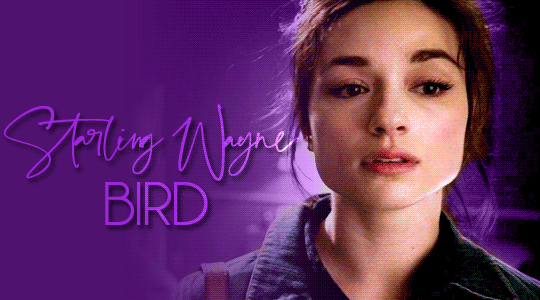
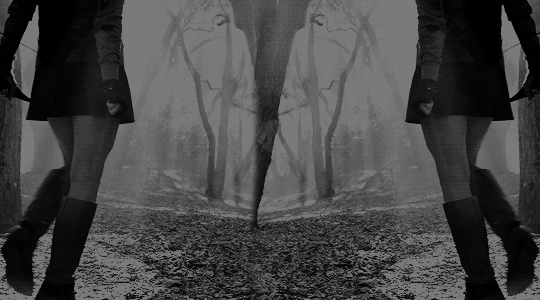

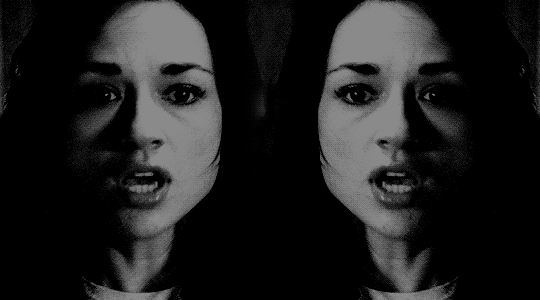
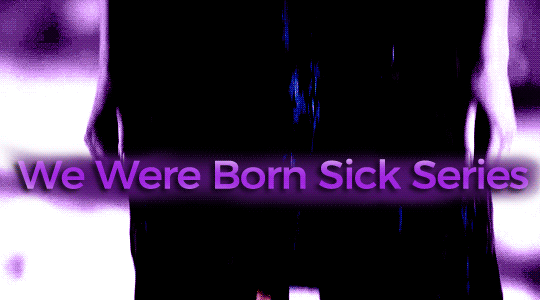
“Everyone wants me to pick a side –bow to either the sinner or the saint, but never both. But that’s exactly who I am and I’ve made peace with that.”
We Were Born Sick Series » Bird Wayne; @twofacedharveydent
#ocappreciation#gotham fanfiction#fic. we were born sick#mine*#made for friend#sagelondyn#sage bday#sage bday 2024#(happy happy birthday bestie boo!)#(🎂🎂🎂)#(i imagined this differently in my head but still happy with how it turned out)#(and i know i've used that quote before in edits but it's one of my faves)
9 notes
·
View notes
Text
Summary: A series of birthdays spent apart. And one together.
Welcome to my birthday party, there will be a chapter posted everyday until my birthday on Tuesday.
#submas#subway boss ingo#subway boss emmet#this first chapter is sad i will admit but it gets much better i promise#this thing has been sitting in my files for fuckin months cuz i couldnt figure out how to write the last part and cuz i kept getting#new story ideas#but the thought of posting this along side it being me birthday was too good to pass up and got me to actually finish this#im so excited this is one of my fave fics that ive written but also all of my fics are one of my fave fics that ive written#hope you enjoy!
13 notes
·
View notes
Text
Water (Is All Around)
Beneath the open sky, there is little risk of the suffocating feeling that sometimes accompanies trying to speak to one another without stumbling over the past. Here there is sun, and clean air, and the beauty of the garden. This is not a tomb.
Fandom: Overwatch Rating: T Category: Gen Characters: Ana, Fareeha Warnings: N/A A fic in which Ana struggles to understand that, although Fareeha does not need her like she used to, she still wants to have a mother. Also on ao3
Some people are uniquely nurturing, know from childhood that they want to be a parent, feel an innate desire to care for others, to cradle their younger siblings and rock to sleep their dolls.
Ana was not one of those children.
She had no interest in her brother until he was old enough to climb trees with her, and while her sisters imagined they were mothers when they played house, she used a toy purse as a briefcase and declared she was going off to work. It was not that she had no interest in traditionally feminine play—she was happy to be a princess with her friends, hosted tea parties for her teddy bears, and never was so still and quiet as when her grandmother taught her to braid and, later, embroider—but she never enjoyed taking care of babies, traded her realistic crying doll to her brother for his building blocks as soon as her mother’s back was turned.
She never imagined she would be a parent, and certainly never thought that she might enjoy it. She had to grow into thinking of herself as a mother, as a person capable of nurturing.
But, much to her surprise, she did. She never liked the swaddling, or the nursing, or even the new baby smell, but she loved the weight of Fareeha falling asleep on her chest, knowing that her daughter felt safest with her, felt immense pride with each new milestone her daughter hit, watching her crawl, and walk, and eventually run, and felt privileged to be able to see the world in a whole new way, experiencing Fareeha’s wonder at each new thing, having her view reframed by a thousand different questions. Motherhood was not what she thought it would be, was not just caretaking, but was the shaping of a new person, the hope of a better future with people like her daughter, curious and compassionate and capable at the helm. It was a chance to build a more peaceful world, and to get to know and to shape a marvelous human being, one that she imagined she would be happy to know even if Fareeha was not her daughter. It was wonderful.
(Yet it did not feel natural, being a mother. For a time, she did not even think of motherhood as something she chose, merely as something that happened to her. She got pregnant, so she got married and had the baby. That was just what one did, what she had been raised to think of as the only option. It was not until her second pregnancy that she realized that she had always thought of Fareeha as her baby, even before the test was confirmed positive, that she had been a source of some anxiety, yes, but never distress. The second pregnancy was only ever a fetus, a headache, a problem for her to solve, but through it she realized she had the ability to choose differently, that keeping her first pregnancy had seemed like a foregone conclusion not because it was what she was programmed to think, but because she had accepted Fareeha as her baby so quickly that it seemed inevitable that she would have her. If she had wanted not to be pregnant then, she could have, would have, chosen differently—because the second time, the second pregnancy, she did.)
It was also difficult, in a way she could not have anticipated.
When Ana had rebelled, as a teenager, cutting her hair short and dressing in men’s clothes, going out with the ‘wrong kind’ of boys and declaring that she did not want to ever get married, her mother had wished that she would raise a daughter like herself, outspoken and all too quick to question authority, eager to go down a different path than the one her parents set before her; at the time, Ana thought such a thing would never happen. She did not believe she wanted children, for one, and knew, too, that she would not place such rigid expectations on them, would not ask a daughter to be quiet and polite, to wear her hair long and be interested in boys, but not too interested, would not think that her baby’s sex determined their future or their interests, would let any child of hers be whom they wished to be. She thought—she knew—she would be different.
In many ways, she was. When Fareeha told her, at twelve years old, that she did not like wearing dresses, wanted to be able to wear dress pants and a nice shirt for a family photo instead, Ana never objected, told her she could wear whatever she liked as long as she at least made herself presentable. When one of Ana’s sisters observed that Fareeha might be going down the wrong path by showing too much interest in other girls, Ana defended her, said that Fareeha was welcome to love whom she chose, and was no less a good daughter because of it—and she was careful to avoid Fareeha being alone with certain parts of their extended family ever again, was always in the room to ensure she could shut down those conversations before they began. When Fareeha wanted to try rock climbing, Ana told her it was dangerous and to be careful, but let her do it, because she knew she could not shield her daughter from every risk, knew what it was to feel smothered by a mother’s overprotectiveness.
And yet, when Fareeha told her she wanted to be a soldier, Ana did not for a second entertain the notion.
She knew, of course, that she should allow her daughter to choose her future for herself, knew well the consequences of doing otherwise, experienced them firsthand in her own relationship with her mother, the distance that grew between them when she was told whom and how to be—but she felt that to let Fareeha go to war was even worse a fate. It would hurt Fareeha, yes, to not be allowed to live out her dreams, but it would surely be worse for her to die. One day, she would come to understand it, would be grateful that her her mother did not allow her to experience war.
(That Fareeha had already experienced war, Ana did not consider. Yes, she was not on the frontlines, but she grew up never knowing when, and if, Ana would return, knew already that fear, and had seen the damage it did to Ana, had felt it in the way she returned a different woman, her mother made a stranger. Fareeha’s choice was more informed than Ana gave her credit for, and Ana had inadvertently already exposed her to the same things she then attempted to shield Fareeha from—or, so Fareeha would later explain was her thinking, at the time. The truth, as they would eventually come to agree upon it, was somewhere in between, that there was a unique damage to the soul that killing would bring her, and Ana had kept her from that, but she was not so shielded from the Crisis and its fallout that she was the innocent Ana believed her to be. She was idealistic, but not entirely naïve.)
In hindsight, it is easy for Ana to see that she should have known better. Faced with the same choice she set before her daughter, to obey or to leave, she defied her mother’s wishes, so it seems obvious, now, that Fareeha would have done the same—they are not so different, after all—but their relationship preceding Ana’s ultimatum was far better, and so she thought, hoped, that it would make the difference, that Fareeha would choose her approval, their bond, over her own wishes.
She did not.
Ana understands why that was, has come to see the ways in which in her absence, gone as she was so long at war, Fareeha came to idolize a fictional version of her, to buy into the myth that so many repeated—that Ana was a hero—and so to believe that in enlisting too someday, she would be honoring a legacy. That idealized Ana, the one who only ever existed in other people’s accounts of her, was in some ways more present in Fareeha’s day to day life than Ana, the mother, flawed and wounded by war. It is only natural that Fareeha would choose to honor the Ana that she knew best.
Natural, too, Ana thinks, that Fareeha would have chosen a legacy over a mother, because she must have known, already, that she did not need Ana anymore. When Ana returned from the Crisis, after so long away, they were virtually strangers to one another; even if Fareeha was always at the forefront of her mind, Ana can acknowledge, now, that Fareeha largely grew up without her present. She feels foolish for ever having thought that loving one another would have been enough to preserve their relationship, when they were both so changed. How hopelessly naïve she must have been, then, to think that Fareeha was not capable of the same stubbornness as she, and to not see that she herself could be equally as cruel as her mother—she cannot believe she allowed things to unfold the way that she did.
But she did.
She did, and now she lives with the consequences of that, of thinking that loving Fareeha was enough to excuse trying to control her, that being family guaranteed her eventual forgiveness.
(That she has never fully forgiven her own mother is neither here nor there.)
For years, they did not speak. In the beginning, it was a mutual decision—they had nothing to say to one another, after that last argument, needed a good cooling off before either of them could begin to forgive the things that were said enough to consider an apology of her own. And then, Ana thought that withholding affection would bring Fareeha around, that she would realize soon enough that being a soldier was not so glorious as she had hoped, and that she would rather have their relationship, after all. Then, when it became clear that she had made the wrong choice, had hurt Fareeha more by not trying to make amends or at least reach out, Ana regretted it, but felt that already too much time had gone by to reverse course. She worried that by that point, Fareeha would not welcome an apology, no matter how sincere. Gradually, that feeling faded, too, consumed as she was by Overwatch’s downfall, everything unraveling around her so quickly she could think of nothing else. After this is over, she told herself, I’ll try to mend things with Fareeha. I just have to fix this, first.
It took her dying—legally, at least—for her to realize that there was no after, for her, that there was always going to be something to take up her time, and nothing, not even her death, would dissuade Fareeha from molding herself in what she believed to be her mother’s image. If anything, it seemed that Ana being declared KIA strengthened her resolve, made her even more determined, at least publicly, to carry on what she saw as the family legacy, with a new tattoo on her face to prove it.
Then, and only then, did Ana come to accept that, even if she did feel she was right about war, and its effect on people, even if she did believe that Fareeha deserved better, there was no sense in trying to dissuade her daughter, and no benefit in not admitting she handled the situation incorrectly. She knew she had to apologize, knew she wanted, more than to be right, to have a relationship with her daughter again.
Still, it did not occur to her that Fareeha would not feel the same way. A letter, an admission of fault, she believed would be enough—and then when that letter failed, another, and another.
It was more than her own mother ever gave her, an admission of guilt.
And it was still not enough. It was still not what Fareeha deserved.
What she deserved was, of course, impossible, was for Ana to have never tried to stop her at all—not in the way that she did, at least—and on some level, Ana came to accept that. She did not forgive herself for what she had done to Fareeha, for creating the rift between them, but she would have been able to live out her life knowing that she was not owed forgiveness, accepting that this was one more regret to add to the list, even if it weighed on her most heavily, had the state of the world not forced the two of them back into contact.
But it did. It did, and she apologized, and much to her shock, the second time, Fareeha accepted her apology.
She has not been forgiven; on that point Fareeha is extremely clear. Forgiveness is a difficult thing, and it will take a long time for her to earn that, to show Fareeha that she deserves it, and for Fareeha to heal enough to offer it to her, but they have come to an understanding that their past cannot be changed, even if they wish it to, and agreed to move forward. For Ana, that is enough.
In fact, it is more than she would have asked for. By the time Fareeha and she were reunited, she had long since given up hope that her relationship with Fareeha would ever be the same, would be truly one of mother and daughter, and so it feels, sometimes, like a dream still, feels like something unearned, something that if she does not hold tightly enough to it, might slip away at any moment.
But she cannot hold on too tightly, for Fareeha resists that still. After so much time apart, it must feel strange to her, to have a mother, and it is only natural that it would chafe, sometimes. She did well enough without Ana, has proven herself to be a fine soldier, and finer woman.
(It used to hurt, that Fareeha did not need her, but now she is glad for it, is glad that she raised her daughter to be strong enough to withstand her disapproval, and her death. One day, she will truly die, and she knows that Fareeha will still be okay, will be able to survive just fine. She has raised a woman who can stand on her own.)
Yet—here she is. Here they both are, standing by a salsabil in the courtyard.
It is out of place, at odds with the modern architecture around it and disconnected from anything that might make it useful, but the sound of the water is soothing, familiar, and just loud enough to obscure a quiet conversation, should someone chance upon them here.
There are more secluded places, of course. If not Fareeha’s living quarters, shared, then Ana’s own, but their private spaces have been the location of so many difficult conversations, of late, that they feel unsuited to the delicate work of grieving. How could Fareeha feel truly comfortable, in a room belonging to Ana? How could Ana dare intrude where Fareeha should have peace?
Safer to be elsewhere. Beneath the open sky, there is little risk of the suffocating feeling that sometimes accompanies trying to speak to one another without stumbling over the past. Here there is sun, and clean air, and the beauty of the garden. This is not a tomb.
And still, bad news. A death, a soldier Fareeha knew, served with, cared for. She does not use the word suicide, when she tells Ana, looks towards the water, weaving its way around the pattern etched in stone.
Once, Ana might have pointed that out, would have told her to say what it was she meant; she has never found it helpful to avoid naming such things, thinks it may ultimately be harmful. Now, however, she reminds herself that it is not her place to say such things. Fareeha is a woman grown, can decide for herself how she prefers to have these conversations, neither needs nor likely wants Ana’s input on that matter.
(It might be hurtful, too, to say it now—Ana knows that. She spent so long thinking that it was an inevitability, being hurt by the world, that the way she felt in the years leading up to Overwatch’s collapse and her time as the Shrike was normal, that she still has to remind herself, in circumstances such as this, that comfort has its place too. There will be time enough later for Fareeha to confront it, when the wound is less fresh, when she feels more able. There is value, in waiting, in allowing oneself to take on one pain at a time. It is not denial, as Ana might once have seen it, is just as much a form of self-preservation as anything. If Fareeha does not yet want to name it, does not feel ready to, it is not Ana’s place to push.)
What Fareeha does want, in telling her this, is a mystery to Ana. Once, she could read her daughter easily, but the woman she has become is not the child Ana knew, no matter how familiar the planes of her face are in the morning sun. It is a terrible thing, too, indecision, alien to Ana in her work and personal life both, but it strikes her just how little she knows of what her daughter needs.
For a few moments, when Fareeha stops speaking, there is only the sound of the water between them, Fareeha’s thoughts concluded and Ana unsure, yet, what she ought to say in response. She thinks this would be easier, if her daughter were truly a stranger, because then she would not need to worry about whether or not to heed the urge to comfort Fareeha, to reach out to her, to say with her touch what she cannot find words for. To a stranger, she would not have the desire to communicate the grief she herself feels, knowing that this is the life her daughter chose, the path she led Fareeha down. If this were not Fareeha, she could just say that she is sorry, and it would be enough.
But this is her daughter, not a stranger. She should say something more personal—do something. She knows it, knows that I’m sorry never helped her in a situation like this, was only a platitude.
Yet she can think of nothing better. To say anything else risks broaching, no matter how unintentionally, that this is what Ana feared Fareeha’s life might be, when she bade her not to enlist. With how aware Fareeha is of that—how painfully so, given their recent conversations—she does not want to risk a misunderstanding, risk her daughter thinking that anything she says is a judgment, an implication, an I told you so couched in different phrasing. That is beyond the point, now. The damage is done. What matters is that she not add to the hurt Fareeha feels already.
Best, then, to keep things simple. “I’m sorry,” says she, from her side of the salsabil.
“I am, too.” There is a tiredness in Fareeha’s voice that ages her, all too familiar.
“Are you going to the funeral?” It feels like small talk, but what else can she say? I wish you didn’t know this pain? I’m sorry I couldn’t protect you? I know how hard it is? No, no, and no, all too close to the arguments of the past, and worse, all things that risk centering herself, here, her wants again, her needs, her feelings. Fareeha does not deserve that.
A small blessing, if one can call it that, Fareeha seems far too consumed by her own thoughts to notice how difficult navigating this conversation is for Ana. “His parents won’t want people to—.” She stops abruptly, shakes her head. “There won’t be a public funeral.” Her voice is harder, there.
“I see.” She does not hide her displeasure. Shame does not help anyone, not with things like this.
“Yes. It’s shit.” Fareeha says it with the sort of anger only grief can bring.
“It is.” Were she speaking to anyone else, she might venture to say something more, but to Fareeha? To Fareeha, it would feel wrong, to comment on the ways in which it astonishes her, the things families feel ashamed of their children for, the lengths they will go to in response to that feeling; her own responses to Fareeha’s choices are surely equally worthy of criticism.
Again, nothing but the sound of the water, the rustling of leaves as a slight breeze finds its way to the courtyard.
She feels it incumbent upon her to say something else. Anger seems a bad note to leave things on—and she is worried for Fareeha, even if she feels she has no right to say as much, given all the pain she has caused her daughter. “Have you reached out to any of his other friends?”
Another shake of the head. “Not yet.”
“It can help.” There was a time, in the Army, and before things with Overwatch really started to go bad, that she could rely on her fellow soldiers to help her through these things; even when it felt like no one else in the world would understand her, they were safe because they knew, too, what it was she was experiencing, and she hopes Fareeha has the same.
(Her own rank eventually robbed her of that, left her with fewer and fewer people to whom she could speak as an equal, until at the end it was only Jack—and he, absorbed as he was in his own problems, was in no place to help her at all. She hopes that Fareeha’s friendships outside her work are stronger, hopes Fareeha’s relationship is better than her own and Sam’s was, hopes Fareeha never, ever knows how that isolation feels.)
“I know,” Fareeha says, perhaps a bit shorter.
She must not want Ana to address her feelings; that is fair. Distant as they are, now, that might sound like an accusation of weakness. Better to stick to other advice, then, “And you’ll want to send your condolences.”
Fareeha’s voice is truly sharp, now. “I’m very aware of how funerals work, Mum.”
Her breath hitches. “You are.” Of course Fareeha is. She had to handle Ana’s own funeral, and Ana cannot believe that she could even for a moment forget that. Fareeha experienced her not-death too, is just as shaped by that time. “I’m sorry,” says she again—as if saying it a thousand times over would be enough. In her previous life, she never apologized, if she could avoid it; now it feels like all she can do. “I’m trying,” She admits, “But I… I don’t know, anymore, what you need from me.”
“Nothing.” Of all the things Fareeha might have said, Ana would not have imagined that, particularly not said so matter-of-factly.
“What?”
“I don’t—I don’t need anything from you.” Fareeha actually faces her now. “I haven’t for years. I just thought…” She trails off.
They are getting somewhere, now, if only Ana can encourage Fareeha to speak. “Thought what?”
Her words have the opposite of their intended effect. “Forget it.” Fareeha makes to leave. “This was a mistake.”
“Fareeha—” Her reflexes are not so dulled by time that she cannot reach across the salsabil to catch Fareeha’s wrist as she goes.
Easily, Fareeha pulls free. “No, Mum,” says she, but at least they are facing one another again. At least she can look Fareeha in the eye.
“Wait.” Ana leaves her arm out, feels on the skin of her wrist the cooler air above the water. “Please.” It is not in her nature to beg, but she does so now. “What should I do?” Her voice breaks with it. She should know. She should know, she should know, she should know but she does not, and it is killing her, is more painful than any wound she has ever had.
Even close enough to touch, Fareeha feels as far away as ever.
“I don’t know.” Fareeha’s cheeks scrunch upwards in a way that Ana recognizes as often a prelude to tears. “You can’t even—you can’t even comfort me anymore.” Once, that might have been an accusation, but now, there is only sadness.
She draws back her hand, puts it over her heart, “I’m trying, Fareeha.” If she knew better how to help, she would, but if this ever came naturally to her, it does not now.
Now, an accusation in full: “You won’t even touch me except to stop me from leaving.”
“I didn’t think you would want me to.” With how far from her Fareeha stood, the salsabil between them, she thought the distance intentional, a barrier to prevent such.
“You didn’t—of course I do!” Now, Fareeha sounds more desperate than angry. Somehow, that is worse. “Why wouldn’t I?”
Because I hurt you, Ana wants to say. That’s all I ever do. To do so would be unhelpful, though, is the sort of self-flagellation that would put the focus on herself, when she wants, more than anything, to be helping Fareeha. “Surely there’s someone better suited,” says she instead.
“You’re my mother.” As if it were so simple.
“That doesn’t make me good at this.” They both know that already; if she were, they would never have gotten to this point in the first place. Even the parts of parenthood Ana most enjoyed never came as easily to her as they did to her husband. “Your father would know what to say.”
“But I don’t want him.”
“And you want me?” After everything that has happened, it is hard to imagine why Fareeha would.
“Yes, Mum! I wouldn’t be here if I didn’t—wouldn’t be dealing with this,” Fareeha makes a sharp gesture with her hands, bringing them into the space between them, “With pulling fucking teeth trying to get anything from you.”
(For a long time, Ana thought that Fareeha switched to English idioms—if not English entirely—during their arguments because it put Ana on the back foot, was a language she was not as good at expressing herself in as her daughter; now she realizes that as much distance as there was between them, as much time as Fareeha spent with her father while Ana was away, it is possible that this is just the only way Fareeha can say what it is she feels. Certainly, Ana did not teach her the words to discuss such difficult things, not when she herself cannot start a conversation like this in any language.)
“I’m not trying to make this difficult.” She hopes her tone is enough that Fareeha sees that for the apology it is. If she knew the words to say to make this better, she would.
“But you do! You do, and it’s exhausting, and I’m trying because I still care about you—because I can’t not—but you have to try too.” Fareeha starts off strong, but gradually the energy behind her words dissipates, desperation settling into a kind of quiet pleading, and then resignation. “Please. Because I can’t—I can’t keep begging you to try to be my mother again. I can’t.”
It hits her like a blow. “I didn’t realize.” If she were a better mother, maybe, she would have, if she knew Fareeha and not just a memory of her, if she were strong enough—no, humble enough—to ask what Fareeha needs from her. “I thought I was giving you space, that you would want me to.”
As it is, she finds it hard to believe that Fareeha wants her back at all, after so long, even if this conversation has made it abundantly clear that she does. Ana truly does not feel that she deserves to ask for any time with her daughter, now that she understands what it did to Fareeha, her disapproval, her absence, her dying.
“Running away is how you solve things.”
(Perhaps it is a bad sign that Ana finds it heartening that Fareeha has the energy left for that anger, but she does. Resignation is worse than resentment; at least to feel that hurt, still, Fareeha must care.)
But what can she say to that?
“I’m sorry,” says Fareeha, when Ana takes too long to find a response. “That was unfair of me.”
“No.” Once, Ana might have been all too happy to let Fareeha apologize to her for such a statement, to take those words as proof that she was the one in the right after all, but she is not, she knows that now—might, in truth, have known it all along. “You’re right,” and there is no use hiding from it. And another admission, too, equally as hard: “I’m terrified of saying something to hurt you, or pushing you away. I know how to fight, Fareeha. I don’t know what to do with peace. Saying nothing feels safer.”
(She never wanted her daughter to know she was afraid.)
“That’s distance, too.”
“I know now.” She should have seen it before, but it is too late for that. The past cannot be changed; the future, at least, is more malleable. She moves around the water, so she is beside her daughter at last, “Forgive me. Please.”
After everything, it is terrifying to ask for that. Fareeha has made it clear that she is not ready, yet, to forgive the past, even if she wants to move forward—and Ana can understand as much, but this? The present? She hopes that at least they have enough common ground that Fareeha can see that at least now, Ana’s intentions are good, even if they play out badly. If Ana has made it impossible for Fareeha to at least acknowledge that much, she is not certain there is any bridging the gap between them.
“Just—be here. Now. Because I need my mom.” That is enough.
“I am here. I am.” A statement, and a promise. She reaches out, finally, to hold her daughter, feels the way Fareeha practically collapses into it, heavier than Ana remembers, but so, so familiar. “I’m not going anywhere,” she whispers, the same way she did when Fareeha was young, as if she were comforting her daughter after a nightmare all over again. “I’m right here.”
The sound of the water runs over the shuddering breath she takes in as she finally lets herself cry.
Some people are uniquely nurturing, know from childhood that they want to be a parent, feel an innate desire to care for others, to cradle their younger siblings and rock to sleep their dolls.
Ana was not one of those children. She had no interest in her brother until he was old enough to climb trees with her, and while her sisters imagined they were mothers when they played house, she used a toy purse as a briefcase and declared she was going off to work. It was not that she had no interest in traditionally feminine play—she was happy to be a princess with her friends, hosted tea parties for her teddy bears, and never was so still and quiet as when her grandmother taught her to braid and, later, embroider—but she never enjoyed taking care of babies, traded her realistic crying doll to her brother for his building blocks as soon as her mother’s back was turned.
She never imagined she would be a parent, and certainly never thought that she might enjoy it. She had to grow into thinking of herself as a mother, as a person capable of nurturing.
But, much to her surprise, she did. She never liked the swaddling, or the nursing, or even the new baby smell, but she loved the weight of Fareeha falling asleep on her chest, knowing that her daughter felt safest with her, felt immense pride with each new milestone her daughter hit, watching her crawl, and walk, and eventually run, and felt privileged to be able to see the world in a whole new way, experiencing Fareeha’s wonder at each new thing, having her view reframed by a thousand different questions. Motherhood was not what she thought it would be, was not just caretaking, but was the shaping of a new person, the hope of a better future with people like her daughter, curious and compassionate and capable at the helm. It was a chance to build a more peaceful world, and to get to know and to shape a marvelous human being, one that she imagined she would be happy to know even if Fareeha was not her daughter. It was wonderful.
(Yet it did not feel natural, being a mother. For a time, she did not even think of motherhood as something she chose, merely as something that happened to her. She got pregnant, so she got married and had the baby. That was just what one did, what she had been raised to think of as the only option. It was not until her second pregnancy that she realized that she had always thought of Fareeha as her baby, even before the test was confirmed positive, that she had been a source of some anxiety, yes, but never distress. The second pregnancy was only ever a fetus, a headache, a problem for her to solve, but through it she realized she had the ability to choose differently, that keeping her first pregnancy had seemed like a foregone conclusion not because it was what she was programmed to think, but because she had accepted Fareeha as her baby so quickly that it seemed inevitable that she would have her. If she had wanted not to be pregnant then, she could have, would have, chosen differently—because the second time, the second pregnancy, she did.)
It was also difficult, in a way she could not have anticipated.
When Ana had rebelled, as a teenager, cutting her hair short and dressing in men’s clothes, going out with the ‘wrong kind’ of boys and declaring that she did not want to ever get married, her mother had wished that she would raise a daughter like herself, outspoken and all too quick to question authority, eager to go down a different path than the one her parents set before her; at the time, Ana thought such a thing would never happen. She did not believe she wanted children, for one, and knew, too, that she would not place such rigid expectations on them, would not ask a daughter to be quiet and polite, to wear her hair long and be interested in boys, but not too interested, would not think that her baby’s sex determined their future or their interests, would let any child of hers be whom they wished to be. She thought—she knew—she would be different.
In many ways, she was. When Fareeha told her, at twelve years old, that she did not like wearing dresses, wanted to be able to wear dress pants and a nice shirt for a family photo instead, Ana never objected, told her she could wear whatever she liked as long as she at least made herself presentable. When one of Ana’s sisters observed that Fareeha might be going down the wrong path by showing too much interest in other girls, Ana defended her, said that Fareeha was welcome to love whom she chose, and was no less a good daughter because of it—and she was careful to avoid Fareeha being alone with certain parts of their extended family ever again, was always in the room to ensure she could shut down those conversations before they began. When Fareeha wanted to try rock climbing, Ana told her it was dangerous and to be careful, but let her do it, because she knew she could not shield her daughter from every risk, knew what it was to feel smothered by a mother’s overprotectiveness.
And yet, when Fareeha told her she wanted to be a soldier, Ana did not for a second entertain the notion.
She knew, of course, that she should allow her daughter to choose her future for herself, knew well the consequences of doing otherwise, experienced them firsthand in her own relationship with her mother, the distance that grew between them when she was told whom and how to be—but she felt that to let Fareeha go to war was even worse a fate. It would hurt Fareeha, yes, to not be allowed to live out her dreams, but it would surely be worse for her to die. One day, she would come to understand it, would be grateful that her her mother did not allow her to experience war.
(That Fareeha had already experienced war, Ana did not consider. Yes, she was not on the frontlines, but she grew up never knowing when, and if, Ana would return, knew already that fear, and had seen the damage it did to Ana, had felt it in the way she returned a different woman, her mother made a stranger. Fareeha’s choice was more informed than Ana gave her credit for, and Ana had inadvertently already exposed her to the same things she then attempted to shield Fareeha from—or, so Fareeha would later explain was her thinking, at the time. The truth, as they would eventually come to agree upon it, was somewhere in between, that there was a unique damage to the soul that killing would bring her, and Ana had kept her from that, but she was not so shielded from the Crisis and its fallout that she was the innocent Ana believed her to be. She was idealistic, but not entirely naïve.)
In hindsight, it is easy for Ana to see that she should have known better. Faced with the same choice she set before her daughter, to obey or to leave, she defied her mother’s wishes, so it seems obvious, now, that Fareeha would have done the same—they are not so different, after all—but their relationship preceding Ana’s ultimatum was far better, and so she thought, hoped, that it would make the difference, that Fareeha would choose her approval, their bond, over her own wishes.
She did not.
Ana understands why that was, has come to see the ways in which in her absence, gone as she was so long at war, Fareeha came to idolize a fictional version of her, to buy into the myth that so many repeated—that Ana was a hero—and so to believe that in enlisting too someday, she would be honoring a legacy. That idealized Ana, the one who only ever existed in other people’s accounts of her, was in some ways more present in Fareeha’s day to day life than Ana, the mother, flawed and wounded by war. It is only natural that Fareeha would choose to honor the Ana that she knew best.
Natural, too, Ana thinks, that Fareeha would have chosen a legacy over a mother, because she must have known, already, that she did not need Ana anymore. When Ana returned from the Crisis, after so long away, they were virtually strangers to one another; even if Fareeha was always at the forefront of her mind, Ana can acknowledge, now, that Fareeha largely grew up without her present. She feels foolish for ever having thought that loving one another would have been enough to preserve their relationship, when they were both so changed. How hopelessly naïve she must have been, then, to think that Fareeha was not capable of the same stubbornness as she, and to not see that she herself could be equally as cruel as her mother—she cannot believe she allowed things to unfold the way that she did.
But she did.
She did, and now she lives with the consequences of that, of thinking that loving Fareeha was enough to excuse trying to control her, that being family guaranteed her eventual forgiveness.
(That she has never fully forgiven her own mother is neither here nor there.)
For years, they did not speak. In the beginning, it was a mutual decision—they had nothing to say to one another, after that last argument, needed a good cooling off before either of them could begin to forgive the things that were said enough to consider an apology of her own. And then, Ana thought that withholding affection would bring Fareeha around, that she would realize soon enough that being a soldier was not so glorious as she had hoped, and that she would rather have their relationship, after all. Then, when it became clear that she had made the wrong choice, had hurt Fareeha more by not trying to make amends or at least reach out, Ana regretted it, but felt that already too much time had gone by to reverse course. She worried that by that point, Fareeha would not welcome an apology, no matter how sincere. Gradually, that feeling faded, too, consumed as she was by Overwatch’s downfall, everything unraveling around her so quickly she could think of nothing else. After this is over, she told herself, I’ll try to mend things with Fareeha. I just have to fix this, first.
It took her dying—legally, at least—for her to realize that there was no after, for her, that there was always going to be something to take up her time, and nothing, not even her death, would dissuade Fareeha from molding herself in what she believed to be her mother’s image. If anything, it seemed that Ana being declared KIA strengthened her resolve, made her even more determined, at least publicly, to carry on what she saw as the family legacy, with a new tattoo on her face to prove it.
Then, and only then, did Ana come to accept that, even if she did feel she was right about war, and its effect on people, even if she did believe that Fareeha deserved better, there was no sense in trying to dissuade her daughter, and no benefit in not admitting she handled the situation incorrectly. She knew she had to apologize, knew she wanted, more than to be right, to have a relationship with her daughter again.
Still, it did not occur to her that Fareeha would not feel the same way. A letter, an admission of fault, she believed would be enough—and then when that letter failed, another, and another.
It was more than her own mother ever gave her, an admission of guilt.
And it was still not enough. It was still not what Fareeha deserved.
What she deserved was, of course, impossible, was for Ana to have never tried to stop her at all—not in the way that she did, at least—and on some level, Ana came to accept that. She did not forgive herself for what she had done to Fareeha, for creating the rift between them, but she would have been able to live out her life knowing that she was not owed forgiveness, accepting that this was one more regret to add to the list, even if it weighed on her most heavily, had the state of the world not forced the two of them back into contact.
But it did. It did, and she apologized, and much to her shock, the second time, Fareeha accepted her apology.
She has not been forgiven; on that point Fareeha is extremely clear. Forgiveness is a difficult thing, and it will take a long time for her to earn that, to show Fareeha that she deserves it, and for Fareeha to heal enough to offer it to her, but they have come to an understanding that their past cannot be changed, even if they wish it to, and agreed to move forward. For Ana, that is enough.
In fact, it is more than she would have asked for. By the time Fareeha and she were reunited, she had long since given up hope that her relationship with Fareeha would ever be the same, would be truly one of mother and daughter, and so it feels, sometimes, like a dream still, feels like something unearned, something that if she does not hold tightly enough to it, might slip away at any moment.
But she cannot hold on too tightly, for Fareeha resists that still. After so much time apart, it must feel strange to her, to have a mother, and it is only natural that it would chafe, sometimes. She did well enough without Ana, has proven herself to be a fine soldier, and finer woman.
(It used to hurt, that Fareeha did not need her, but now she is glad for it, is glad that she raised her daughter to be strong enough to withstand her disapproval, and her death. One day, she will truly die, and she knows that Fareeha will still be okay, will be able to survive just fine. She has raised a woman who can stand on her own.)
Yet—here she is. Here they both are, standing by a salsabil in the courtyard.
It is out of place, at odds with the modern architecture around it and disconnected from anything that might make it useful, but the sound of the water is soothing, familiar, and just loud enough to obscure a quiet conversation, should someone chance upon them here.
There are more secluded places, of course. If not Fareeha’s living quarters, shared, then Ana’s own, but their private spaces have been the location of so many difficult conversations, of late, that they feel unsuited to the delicate work of grieving. How could Fareeha feel truly comfortable, in a room belonging to Ana? How could Ana dare intrude where Fareeha should have peace?
Safer to be elsewhere. Beneath the open sky, there is little risk of the suffocating feeling that sometimes accompanies trying to speak to one another without stumbling over the past. Here there is sun, and clean air, and the beauty of the garden. This is not a tomb.
And still, bad news. A death, a soldier Fareeha knew, served with, cared for. She does not use word suicide, when she tells Ana, looks towards the water, weaving its way around the pattern etched in stone.
Once, Ana might have pointed that out, would have told her to say what it was she meant; she has never found it helpful to avoid naming such things, thinks it may ultimately be harmful. Now, however, she reminds herself that it is not her place to say such things. Fareeha is a woman grown, can decide for herself how she prefers to have these conversations, neither needs nor likely wants Ana’s input on that matter.
(It might be hurtful, too, to say it now—Ana knows that. She spent so long thinking that it was an inevitability, being hurt by the world, that the way she felt in the years leading up to Overwatch’s collapse and her time as the Shrike was normal, that she still has to remind herself, in circumstances such as this, that comfort has its place too. There will be time enough later for Fareeha to confront it, when the wound is less fresh, when she feels more able. There is value, in waiting, in allowing oneself to take on one pain at a time. It is not denial, as Ana might once have seen it, is just as much a form of self-preservation as anything. If Fareeha does not yet want to name it, does not feel ready to, it is not Ana’s place to push.)
What Fareeha does want, in telling her this, is a mystery to Ana. Once, she could read her daughter easily, but the woman she has become is not the child Ana knew, no matter how familiar the planes of her face are in the morning sun. It is a terrible thing, too, indecision, alien to Ana in her work and personal life both, but it strikes her just how little she knows of what her daughter needs.
For a few moments, when Fareeha stops speaking, there is only the sound of the water between them, Fareeha’s thoughts concluded and Ana unsure, yet, what she ought to say in response. She thinks this would be easier, if her daughter were truly a stranger, because then she would not need to worry about whether or not to heed the urge to comfort Fareeha, to reach out to her, to say with her touch what she cannot find words for. To a stranger, she would not have the desire to communicate the grief she herself feels, knowing that this is the life her daughter chose, the path she led Fareeha down. If this were not Fareeha, she could just say that she is sorry, and it would be enough.
But this is her daughter, not a stranger. She should say something more personal—do something. She knows it, knows that I’m sorry never helped her in a situation like this, was only a platitude.
Yet she can think of nothing better. To say anything else risks broaching, no matter how unintentionally, that this is what Ana feared Fareeha’s life might be, when she bade her not to enlist. With how aware Fareeha is of that—how painfully so, given their recent conversations—she does not want to risk a misunderstanding, risk her daughter thinking that anything she says is a judgment, an implication, an I told you so couched in different phrasing. That is beyond the point, now. The damage is done. What matters is that she not add to the hurt Fareeha feels already.
Best, then, to keep things simple. “I’m sorry,” says she, from her side of the salsabil.
“I am, too.” There is a tiredness in Fareeha’s voice that ages her, all too familiar.
“Are you going to the funeral?” It feels like small talk, but what else can she say? I wish you didn’t know this pain? I’m sorry I couldn’t protect you? I know how hard it is? No, no, and no, all too close to the arguments of the past, and worse, all things that risk centering herself, here, her wants again, her needs, her feelings. Fareeha does not deserve that.
A small blessing, if one can call it that, Fareeha seems far too consumed by her own thoughts to notice how difficult navigating this conversation is for Ana. “His parents won’t want people to—.” She stops abruptly, shakes her head. “There won’t be a public funeral.” Her voice is harder, there.
“I see.” She does not hide her displeasure. Shame does not help anyone, not with things like this.
“Yes. It’s shit.” Fareeha says it with the sort of anger only grief can bring.
“It is.” Were she speaking to anyone else, she might venture to say something more, but to Fareeha? To Fareeha, it would feel wrong, to comment on the ways in which it astonishes her, the things families feel ashamed of their children for, the lengths they will go to in response to that feeling; her own responses to Fareeha’s choices are surely equally worthy of criticism.
Again, nothing but the sound of the water, the rustling of leaves as a slight breeze finds its way to the courtyard.
She feels it incumbent upon her to say something else. Anger seems a bad note to leave things on—and she is worried for Fareeha, even if she feels she has no right to say as much, given all the pain she has caused her daughter. “Have you reached out to any of his other friends?”
Another shake of the head. “Not yet.”
“It can help.” There was a time, in the Army, and before things with Overwatch really started to go bad, that she could rely on her fellow soldiers to help her through these things; even when it felt like no one else in the world would understand her, they were safe because they knew, too, what it was she was experiencing, and she hopes Fareeha has the same.
(Her own rank eventually robbed her of that, left her with fewer and fewer people to whom she could speak as an equal, until at the end it was only Jack—and he, absorbed as he was in his own problems, was in no place to help her at all. She hopes that Fareeha’s friendships outside her work are stronger, hopes Fareeha’s relationship is better than her own and Sam’s was, hopes Fareeha never, ever knows how that isolation feels.)
“I know,” Fareeha says, perhaps a bit shorter.
She must not want Ana to address her feelings; that is fair. Distant as they are, now, that might sound like an accusation of weakness. Better to stick to other advice, then, “And you’ll want to send your condolences.”
Fareeha’s voice is truly sharp, now. “I’m very aware of how funerals work, Mum.”
Her breath hitches. “You are.” Of course Fareeha is. She had to handle Ana’s own funeral, and Ana cannot believe that she could even for a moment forget that. Fareeha experienced her not-death too, is just as shaped by that time. “I’m sorry,” says she again—as if saying it a thousand times over would be enough. In her previous life, she never apologized, if she could avoid it; now it feels like all she can do. “I’m trying,” She admits, “But I… I don’t know, anymore, what you need from me.”
“Nothing.” Of all the things Fareeha might have said, Ana would not have imagined that, particularly not said so matter-of-factly.
“What?”
“I don’t—I don’t need anything from you.” Fareeha actually faces her now. “I haven’t for years. I just thought…” She trails off.
They are getting somewhere, now, if only Ana can encourage Fareeha to speak. “Thought what?”
Her words have the opposite of their intended effect. “Forget it.” Fareeha makes to leave. “This was a mistake.”
“Fareeha—” Her reflexes are not so dulled by time that she cannot reach across the salsabil to catch Fareeha’s wrist as she goes.
Easily, Fareeha pulls free. “No, Mum,” says she, but at least they are facing one another again. At least she can look Fareeha in the eye.
“Wait.” Ana leaves her arm out, feels on the skin of her wrist the cooler air above the water. “Please.” It is not in her nature to beg, but she does so now. “What should I do?” Her voice breaks with it. She should know. She should know, she should know, she should know but she does not, and it is killing her, is more painful than any wound she has ever had.
Even close enough to touch, Fareeha feels as far away as ever.
“I don’t know.” Fareeha’s cheeks scrunch upwards in a way that Ana recognizes as often a prelude to tears. “You can’t even—you can’t even comfort me anymore.” Once, that might have been an accusation, but now, there is only sadness.
She draws back her hand, puts it over her heart, “I’m trying, Fareeha.” If she knew better how to help, she would, but if this ever came naturally to her, it does not now.
Now, an accusation in full: “You won’t even touch me except to stop me from leaving.”
“I didn’t think you would want me to.” With how far from her Fareeha stood, the salsabil between them, she thought the distance intentional, a barrier to prevent such.
“You didn’t—of course I do!” Now, Fareeha sounds more desperate than angry. Somehow, that is worse. “Why wouldn’t I?”
Because I hurt you, Ana wants to say. That’s all I ever do. To do so would be unhelpful, though, is the sort of self-flagellation that would put the focus on herself, when she wants, more than anything, to be helping Fareeha. “Surely there’s someone better suited,” says she instead.
“You’re my mother.” As if it were so simple.
“That doesn’t make me good at this.” They both know that already; if she were, they would never have gotten to this point in the first place. Even the parts of parenthood Ana most enjoyed never came as easily to her as they did to her husband. “Your father would know what to say.”
“But I don’t want him.”
“And you want me?” After everything that has happened, it is hard to imagine why Fareeha would.
“Yes, Mum! I wouldn’t be here if I didn’t—wouldn’t be dealing with this,” Fareeha makes a sharp gesture with her hands, bringing them into the space between them, “With pulling fucking teeth trying to get anything from you.”
(For a long time, Ana thought that Fareeha switched to English idioms—if not English entirely—during their arguments because it put Ana on the back foot, was a language she was not as good at expressing herself in as her daughter; now she realizes that as much distance as there was between them, as much time as Fareeha spent with her father while Ana was away, it is possible that this is just the only way Fareeha can say what it is she feels. Certainly, Ana did not teach her the words to discuss such difficult things, not when she herself cannot start a conversation like this in any language.)
“I’m not trying to make this difficult.” She hopes her tone is enough that Fareeha sees that for the apology it is. If she knew the words to say to make this better, she would.
“But you do! You do, and it’s exhausting, and I’m trying because I still care about you—because I can’t not—but you have to try too.” Fareeha starts off strong, but gradually the energy behind her words dissipates, desperation settling into a kind of quiet pleading, and then resignation. “Please. Because I can’t—I can’t keep begging you to try to be my mother again. I can’t.”
It hits her like a blow. “I didn’t realize.” If she were a better mother, maybe, she would have, if she knew Fareeha and not just a memory of her, if she were strong enough—no, humble enough—to ask what Fareeha needs from her. “I thought I was giving you space, that you would want me to.”
As it is, she finds it hard to believe that Fareeha wants her back at all, after so long, even if this conversation has made it abundantly clear that she does. Ana truly does not feel that she deserves to ask for any time with her daughter, now that she understands what it did to Fareeha, her disapproval, her absence, her dying.
“Running away is how you solve things.”
(Perhaps it is a bad sign that Ana finds it heartening that Fareeha has the energy left for that anger, but she does. Resignation is worse than resentment; at least to feel that hurt, still, Fareeha must care.)
But what can she say to that?
“I’m sorry,” says Fareeha, when Ana takes too long to find a response. “That was unfair of me.”
“No.” Once, Ana might have been all too happy to let Fareeha apologize to her for such a statement, to take those words as proof that she was the one in the right after all, but she is not, she knows that now—might, in truth, have known it all along. “You’re right,” and there is no use hiding from it. And another admission, too, equally as hard: “I’m terrified of saying something to hurt you, or pushing you away. I know how to fight, Fareeha. I don’t know what to do with peace. Saying nothing feels safer.”
(She never wanted her daughter to know she was afraid.)
“That’s distance, too.”
“I know now.” She should have seen it before, but it is too late for that. The past cannot be changed; the future, at least, is more malleable. She moves around the water, so she is beside her daughter at last, “Forgive me. Please.”
After everything, it is terrifying to ask for that. Fareeha has made it clear that she is not ready, yet, to forgive the past, even if she wants to move forward—and Ana can understand as much, but this? The present? She hopes that at least they have enough common ground that Fareeha can see that at least now, Ana’s intentions are good, even if they play out badly. If Ana has made it impossible for Fareeha to at least acknowledge that much, she is not certain there is any bridging the gap between them.
“Just—be here. Now. Because I need my mom.” That is enough.
“I am here. I am.” A statement, and a promise. She reaches out, finally, to hold her daughter, feels the way Fareeha practically collapses into it, heavier than Ana remembers, but so, so familiar. “I’m not going anywhere,” she whispers, the same way she did when Fareeha was young, as if she were comforting her daughter after a nightmare all over again. “I’m right here.”
The sound of the water runs over the shuddering breath she takes in as she finally lets herself cry.
#rory writes fic#happy birthday ana amari!!#heres 5k words of you and fareeha struggling to understand one another post reconciliation LMAOOOO#listen this is still my fave overwatch dynamic. like. damn i love mothers who struggle to meet their daughters emotional needs
3 notes
·
View notes
Note
OMG HAPPY BIRTHDAY DAY TO THE BEST PERSON ON THIS APP!!!! LOVE YOU <3
WAILING WEEPING SOBBING THANK YOU BABES <333 LOVE YOU TOO!!!!! <333
HAVE SOME CAKE

#op's birthday#tumblr user torrancefavgirl#i probs say this a lot but like#it still feels weird when people say they love my writing or that i'm their fave???????#/pos#like it's probs just cause i'm too subjective but I feel like i have no scope of the impact i have on people yk#the only reason I consider myself to have 'made it' as a fic writer is cause I have at least one follower and I've recieved one death threa#which are completely self imposed standards#but yeah#the fact that yall actually love my writing seriously means the world to me#tw death threats#tw: death threats#also i'm okay about all that btw it was years ago and it was really funny lmao /gen#but yeah I love yall a lot#thank you for making everything so lovley and special#i've been making slow and steady progress on my first book btw!!!#you guys are gonna love it#the character dynamics are so great#plus it's a great sand box#is this the first stepping stone into the op cinematic universe??????#mayhaps#just keep an eye out for any familiar names or faces or locations as i start releasing more and more unrelated books lol#who doesn't love a good conspiracy
5 notes
·
View notes
Note
a very very happy birthday kai !!!!!!!!!!!! i hope you have a wonderful wonderful day and i hope you have lots of cake and joy on your special day !! <3
zee !! thank you so much dear waaaahh <3
#i wish i had lots of cake and joy buuuuut#i’m gonna live in a fantasy realm of dumbi’s birthday fic where i had plenty of cake n love )):#your pinned post is my fave arctic monkeys soon i just made such a happy noise opening your blog btw#esteemed guest.zee#( tea with the general )#© thexianzhoujade#alexi's 2024 birthday !!
1 note
·
View note
Text
girl, so confusing | f1
an: this is SADLY the last part :( don’t worry, i do plan on writing more fics for the f1 dilf!! here’s your long awaited reveal on the baby daddy lol made this one extra long for y’all <3 enjoy!!
part 1 part 2
faceclaim gisele bündchen
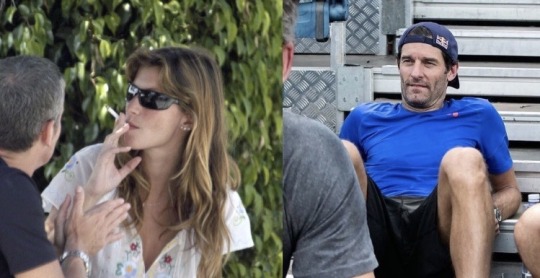
liked by ynstyle, goss1pformulas and others
f1gossiproom could mark webber be the father? recently former red bull and williams drivers, mark and y/n have been spending time together. the pair were spotted having dinner several times and a source confirmed that webber attended y/n’s daughter’s recital! they were once again spotted out in australia spending time in bondi beach with y/n’s daughter (not pictured to protect her privacy) they were soon joined by friends and webber’s family. a source, who wishes to remain anonymous, saw them and said y/n’s daughter, gemma, and mark were bonding as if they were dad and daughter 👀 he even calls her ‘gem’ and ‘gemmy’! what do you think? is mark webber the real father? we certainly think so!
formulaho3 how about just leave them alone?
roscoesno1fan mark looks like a total dilf in that pic so yes
oscarspastry what if the real father is the friends we made along the way?
webberxvettel i need to know the truth before i die
hamiltonsmerecedes not f1 twitter trying to cancel y/n for getting with their faves 😭
lnwhores i stand by my cancelled wife
myhonestbitchface and when y/n reveals that sebastian is the bd then what 🤨 i feel it in my gut 👀 that german bitch is the bd
blackwidowswife bitch you’re just hungry
load more comments
THE PADDOCK SESSIONS has posted a new YouTube video!
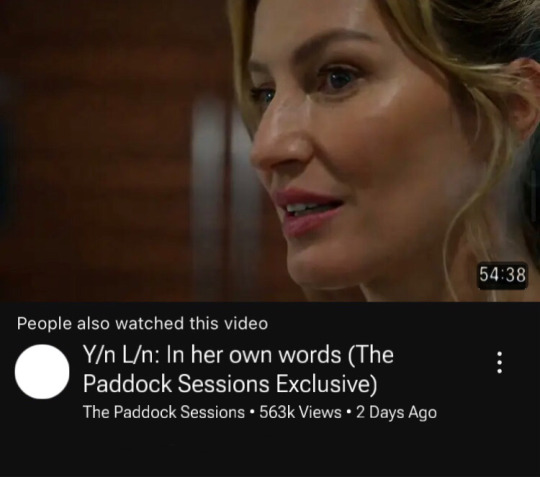
Italics = voiceover by y/n
“Hello!” Y/n’s daughter, Gemma, opened the door to Dan. She knew that he was going to film an interview with her mother about her racing career. She watched as Dan’s camera man waved to her. She assumed they had already started filming.
“Gemma hates and loves when I’m away. She stays with her grandparents when I have to leave or if her dad is not busy then they’ll be together. I think she loves it because her dad lets her have ice cream before bed. I’m more of a strict parent between me and him.”
Photos of little Gemma appear on screen. The young girl was picture with her mother on her first birthday, then with Mark and family members then Sebastian and Jenson.
Dan entered Y/n’s London home with Gemma by his side. He spotted Y/n making tea. “Got here just in time.” He laughed as he joined the former driver in the kitchen.
“I hope the flight here wasn’t too bad.” Y/n passed a mug over to Dan.
“Slept my way through it,” before Dan could take a sip from his tea, he noticed the mug that he was given. It had ‘best dad ever’ sloppily written in paint. “Cute.” He held the mug up and smiled.
“Yeah, Gemma made it for her dad last year for Father’s Day.” Y/n smiled proudly at her daughter’s creation.
That’s when Gemma joined the conversation. “But I couldn’t give it to him on actual Father’s Day! He was away racing and couldn’t be here so I had to give it to him later.” She explained.
After the pair finished their tea, they walked together to Y/n’s small garden. There she had a little seating area where the rest of the interview would take place.
“Lovely garden.” Dan commented.
“Thank you, although I won’t take all the credit. Sebastian comes to help, Gemma kind of bosses him around telling him where each flower looks best.” Y/n laughed, setting her mug on the glass table.
“Dad loves the flowers I picked out for the garden.” Gemma pointed out as she joined them outside. As Dan started the interview, Gemma kept playing outside with her toys.
More images of a young Y/n flashed on screen. She was driving for Williams at the time, they were her first ever team.
“Williams was my first home. They were nice to me, but they put so much pressure on me to perform, like every race had to be perfect. And when it wasn’t, you could feel the disappointment, like a weight hanging in the air. I’d go back to my hotel room at night, and it was just me and the silence.”
The video showed a clip of young Y/n in the Williams garage getting ready for her debut race. She noticed the camera then smiled and waved. The video then cuts to from a happy, full of life Y/n to a gloomy, quiet Y/n sitting alone in her garage.
“I didn’t have friends in the paddock back then. Everyone was focused on their own thing, and the people around me—the trainers, the engineers—they all kept their distance. One of my trainers actually told me, ‘I’m not here to be your friend; I’m here to work.’ And that’s when I realized I was completely on my own."
Y/n then looked over her shoulder and saw Gemma using a teddy bear that her father had bought the girl for her birthday last year in Germany. The former driver smiled at the memory of her little family spending a special day together.
Back to the interview, Y/n then talked to Dan about her divorce. It was a dark time for her. She had been young when she said ‘I Do’ to a man she thought was the love of her life. At the time of her marriage, her husband was six years older. She was nineteen at the time, about to turn twenty.
Several headlines from the day her marriage was announced appeared on screen.
“Barely an Adult, Already a Wife: Y/N Marries Six Years Her Senior”
“Y/N’s Whirlwind Marriage: Chasing Love, Not Podiums?”
“Teenage Racer’s Rush to the Altar: Desperate for Love or Just Immature?”
“Is Y/N Looking for Validation in All the Wrong Places?”
“‘She’ll Marry Anyone’: Critics Slam Y/N’s Hasty Decision at Just 19”
"They painted me as some kind of desperate girl who couldn’t handle being alone. The truth was, I was 19, scared, and in love—or at least I thought I was. But that didn’t matter to them. They just wanted to sell papers."
Dan then spoke. “What led to the divorce?”
Y/n sighed deeply. Only a few people knew the real reason. “It’s . . . a complicated thing to talk about. I mean, when you’re nineteen and in love, or what you think is love, you don’t always see the red flags. At the time, I thought I’d found someone who believed in me, who would support me no matter what. But as time went on, I realized that wasn’t the case."
A picture of Y/n getting ready by herself on her wedding day appears on screen. Her family were not present as her husband at the time wanted it to be only them. She smiled brightly at the camera as her photo was taken. The image fades then clips of Y/n racing in the early 2000s play.
“He wanted a family. Kids, a house, the whole thing. And there’s nothing wrong with that, but he wanted it then, right when my career was just beginning. He gave me an ultimatum—racing or him."
Dan lightly gasped at her words. “Oh . . .”
“I chose racing. How could I not? It was everything I’d worked for, everything I’d dreamed of. But he didn’t take it well. He made me feel like I was selfish, like I was throwing away a chance at a ‘real’ life."
Several more images of Y/n and her then husband flash on screen. There’s no photos of him attending races, mostly because he thought racing was dumb and didn’t like loud crowds.
“He didn’t trust me. Whenever I was away at races, he’d insist I call him every single day, sometimes multiple times. If I missed a call because I was in a meeting or debrief, he’d accuse me of . . . things. Things that weren’t true. I couldn’t even have a normal conversation with my trainer or my team principal without worrying about how he’d react."
"There were times I wanted to visit my family, to go home and just breathe. But he’d make me feel so guilty for even thinking about it, like I was abandoning him. So I stopped trying."
The screen cuts back to Y/N on the sofa. Her hands are clasped tightly now, her voice calm but with an undercurrent of emotion.
“And then the divorce was final and for a moment I was happy until he went to the media spreading all sorts of lies.” Y/n added.
Several more magazine headlines appear on screen.
“The Truth About Y/N: Ex-Husband Reveals Why Their Marriage Failed”
“‘She Wanted the World to Love Her, Not Me’: Y/N’s Ex Speaks Out”
“‘All She Cared About Was Fame’: Y/N’s Ex-Husband Speaks Out About Their Divorce”
Then the screen cuts to clips of Y/n’s ex husband being interviewed about their marriage.
“I sacrificed so much to support her career, but she couldn’t give me the one thing I wanted: a family. She was too busy chasing the cameras and the glory.”
“It was rough. Instead of being asked about racing, I was asked about my failed marriage.” Y/n recalled all the times during interviews when her ex-husband’s name was mentioned. “I just wanted to go home a cry, but I had a job to do. But of course the attention I was getting got me fired.”
“How were you told you were no longe driving for Williams?” Dan asked.
“Would you believe it if I said it was a ten second phone call from Claire Williams?” Y/n laughed. “Claire and I were never enemies. A few days after I got her call, she had dinner in my house and explained to me that she didn’t want to be the one to call me, but she was pressured to. Apparently the Williams team thought it was best for her to tell me in a phone call because they thought it would be ‘easier’ if the news came from her, since she’s a woman. They thought it would hurt less coming from her. Can you believe that?"
Dan noticed how Y/n laughed at the mention of the famous ten second phone call.
“It was definitely ridiculous of them. But they didn’t understand how humiliating it was either way. But Claire . . . I could tell she hated it. She ended the call so quickly because she didn’t want to do it. She didn’t want me to be dropped from the team."
A photo showed of Claire Williams talking to Y/n before a race. At the time, Y/n didn’t know it, but Claire was her only friend.
“I don’t blame her for how it happened. She was caught in the middle of a decision that wasn’t hers to make. And honestly, her coming to my house afterward to explain—that meant something. It didn’t fix anything, but it showed she cared." Y/n finished drinking her tea then resumed speaking. “That ten-second call changed everything for me. But at least I know it wasn’t Claire’s choice. It was just . . . Williams being Williams."
“After everything that happened with Williams, you had every reason to step away from the sport. But instead, you joined McLaren. Looking back now, would you say that was the decision that changed everything for the better?" Dan questioned. He watched as her face softened. She truly adored her time with mclaren.
Y/n nodded. “Joining McLaren felt like a fresh start, like a second chance to prove what I was capable of. At Williams, I was just surviving. But at McLaren, I got to thrive."
Clips of Y/n during her time with the mclaren team played. Her smile was genuine and she looked happier than ever.
“I wasn’t sure if I wanted to keep racing. I didn’t know if I could trust another team. But McLaren . . . they believed in me in a way no one else had."
"It wasn’t just about the racing, though. McLaren gave me a second chance, not just at my career, but at myself. It reminded me why I fell in love with this sport in the first place."
“And then came those three idiots.” Y/n laughed when she remembered becoming friends with Mark, Jenson and Sebastian. Her cheeks tinting slightly, but her smile stays steady.
“But with that friendship came negative comments. I remember reading articles calling you horrible names just for having friendships with them.” Dan commented.
“Those negative comments still come my way even after many years,” Y/n added. “I stayed away from social media for that same reason until recently.”
“But with sharing your life on social media also came questions about your daughters life as well.”
Y/n knew it was something that was going to come up in the interview. Dan didn’t want to ask, but Y/n wanted to share. Gemma’s father and her had discussed it before and they both agreed to the interview.
“Yeah, the whole ‘who’s the father?’ thing has taken over every social media app i have. I can’t avoid it, especially when people constantly message me about it.” Y/n spoke. “Jenson thinks it’s hilarious.”
“Jenson?” Dan questioned.
“Yeah, he sent me a meme about it comparing us to Mamma Mia. I sent it to Sebastian and he sent it to Mark.”
The remainder of the interview, Y/n talked about her family she shared with the man who endlessly supported through everything. Every time she talked about him, she smiled brightly. It was clear that she loved him and their daughter more than anything.
As the video came to an end, Gemma was seen running towards someone who was out of frame. “Dad’s home!” Gemma jumped into his arms and hugged him.
“I thought you were flying in next week.” Y/n stood up to hug him.
“I come here to surprise you and Gem and this is how I’m treated?” He placed a kiss on Y/n’s temple, still holding onto Gemma. “Sorry, I definitely interrupted you two, haven’t I?”
“It’s alright, Jenson. We were just wrapping things up.”
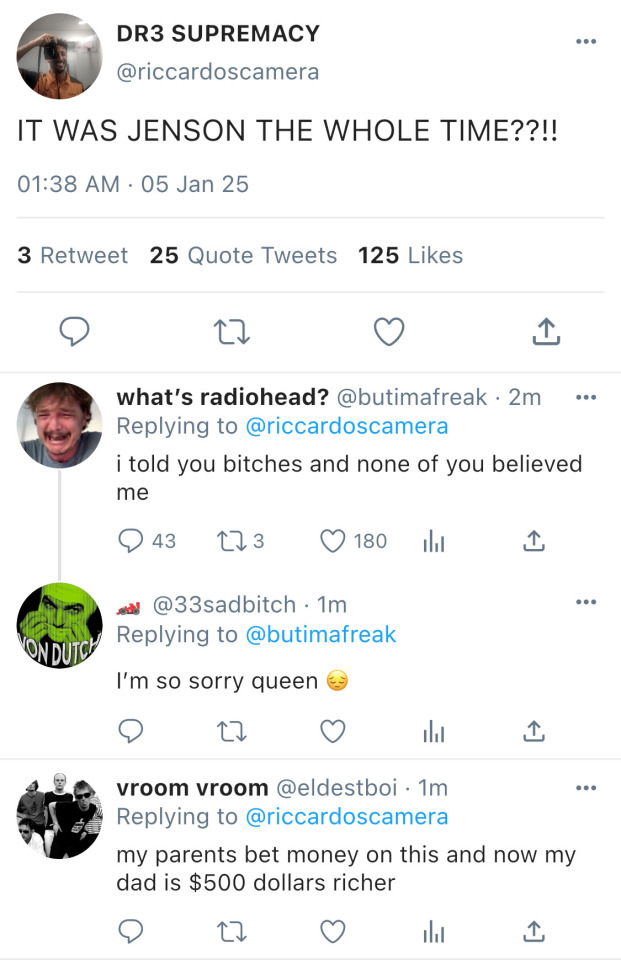
INSTAGRAM
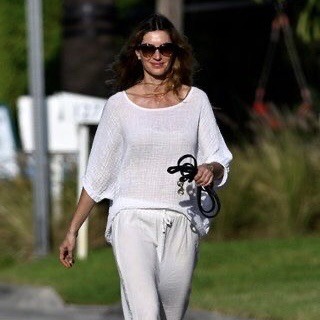
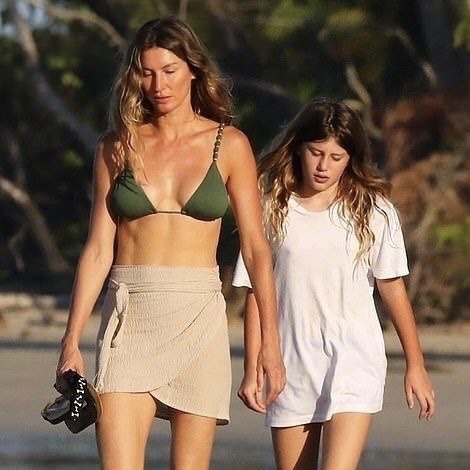
liked by landonorris, wagstyle and others
f1gossip after finally revealing the identity of her daughter’s father, y/n and her daughter gemma were seen together in a beach in california 👀 jenson button also lives in california so we’re thinking the button family is spending some time together.
vettelsbees GIRL SEB WAS SPOTTED AT LAX
hamiltonsmercedes AND MARK
nicorosbergisadiva WHAT IS GOING ONNNN
landonorris hey i know her
ferraridepressionclub ARIANA WHAT ARE YOU DOING HEREEE
webbertears what do you know you gremlin
load more comments
“Can I have money for ice cream?” Gemma ran up to her parents, Mark and Sebastian. The former drivers were all enjoying the sunshine of California, an idea that came from Gemma. She had been the one to call Mark and Sebastian to join her and her parents. They agreed even if they cancelled their plans with friends. They would literally do anything for the young girl.
Without hesitation, all the men took out their wallets and took out money for the girl. Their actions caused both Gemma and Y/n to laugh.
“Okay, thank you.” She gladly took the money from each of them.
“I’ll go with you, Gemmy,” Mark said as he got up from his spot and took Gemma’s hand in his. Together they walked to the ice cream stand.
“Has Claire called you?” Sebastian wondered. Ever since the interview was posted, the Williams team had posted several posts of Y/n when she was driving for them. They were finally acknowledging her wins and podiums. And of course they received some criticism from fans.
“She messaged me letting me know she watched the interview. She’s happy I did it.” Y/n replied.
“We all are. You should’ve done the interview years ago.” Jenson said.
Y/n only nodded and turned her attention to Mark and Gemma. The girl had always been close to both the German and Australian drivers, how couldn’t she when they had been in her mothers life and now they were in hers.
“Gemma asked if she could go to a race, but she wants you all to be there.” Y/n spoke up. Gemma desperately wanted the three men to join her. Y/n knew they would all say yes immediately.
“Did she say which one?” Sebastian asked.
“She said she wants to go to each of your home races.” Y/n grinned as Jenson immediately said he was in. Sebastian laughed then nodded. Of course they would join Gemma, the girl had them all wrapped around her finger.
“And will you be attending too?” Jenson winked at her. “We could do a repeat of what happened after Australia.”
“Funny, I was about to suggest the same thing but it happened in Canada.” Sebastian teased.
“Well weren’t you a busy woman.” Jenson smirked. “And Mark?”
Y/n kept quiet, innocently sipping her lemonade. After setting her drink down, the former drivers waited for her answer. “If you must know . . . We were in Vegas.”
Jenson groaned. “I was thinking Monaco.”
“What happens in Vegas stays in Vegas, baby.”
#formula 1#f1 x reader#formula 1 imagine#f1 imagine#f1 x you#f1#mark webber x reader#sebastian vettel x reader#jenson button x reader#f1 driver!reader#sv5 x reader#mw2 x reader#jb22 x reader
529 notes
·
View notes